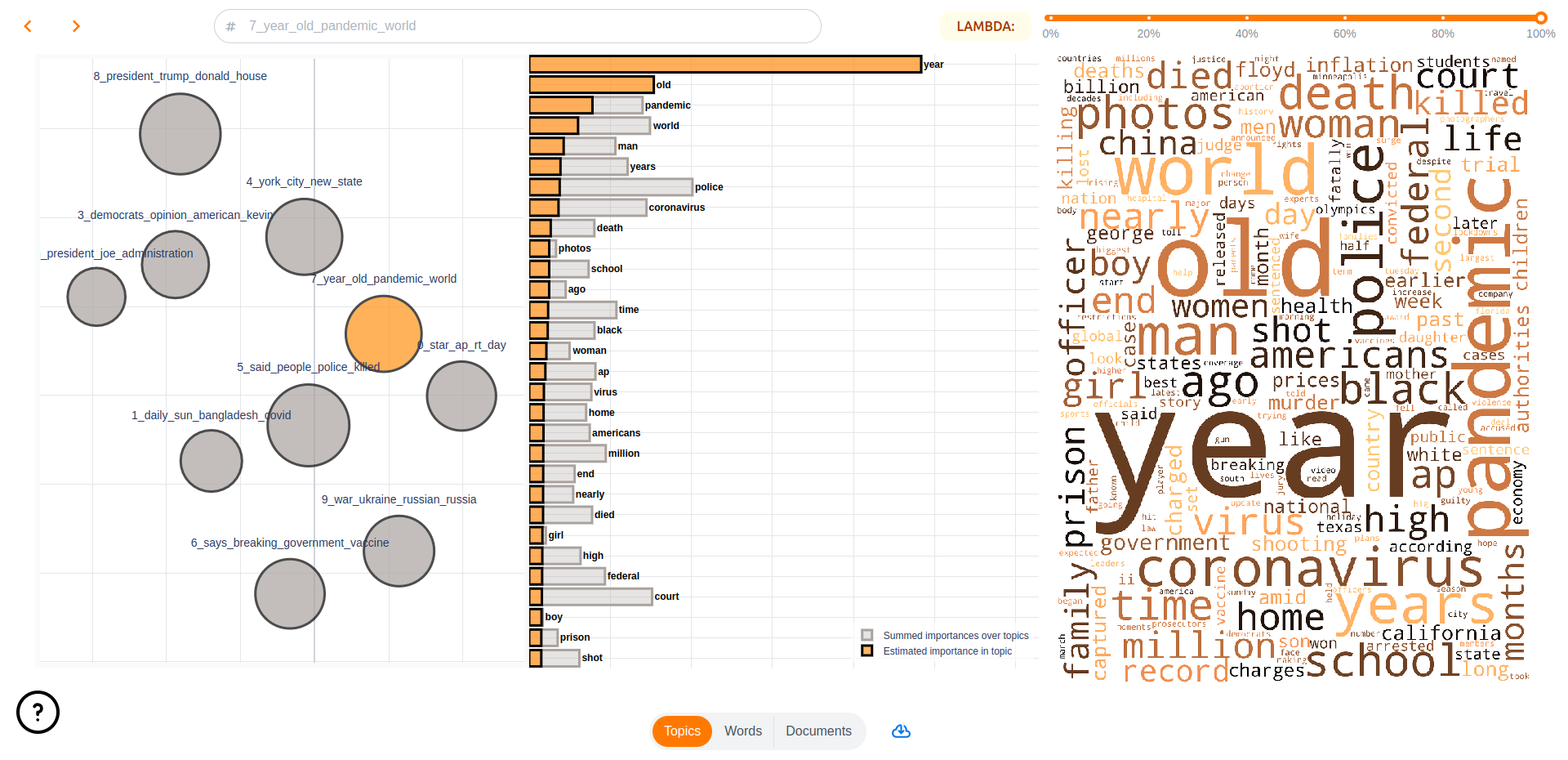
turftopic
Robust and fast topic models with sentence-transformers.
Stars: 80
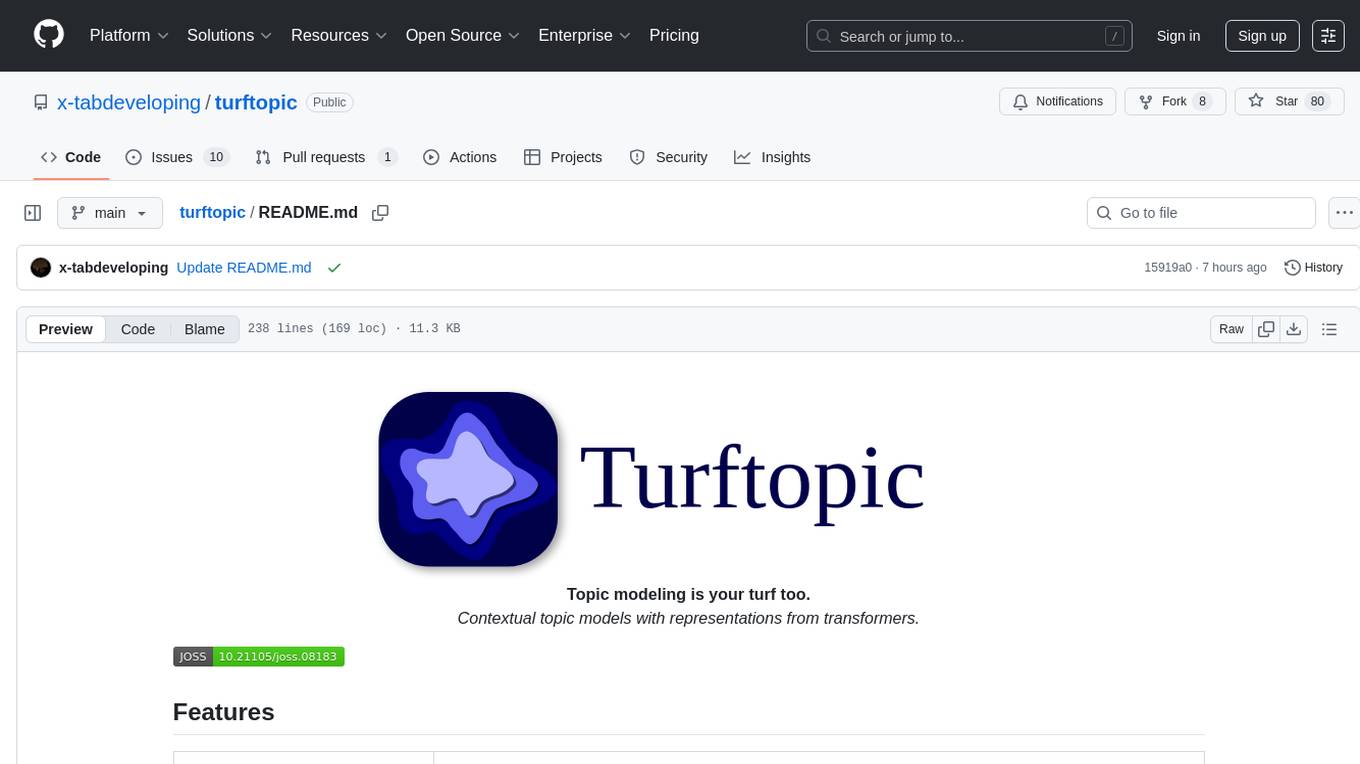
Turftopic is a Python library that provides tools for sentiment analysis and topic modeling of text data. It allows users to analyze large volumes of text data to extract insights on sentiment and topics. The library includes functions for preprocessing text data, performing sentiment analysis using machine learning models, and conducting topic modeling using algorithms such as Latent Dirichlet Allocation (LDA). Turftopic is designed to be user-friendly and efficient, making it suitable for both beginners and experienced data analysts.
README:
Topic modeling is your turf too.
Contextual topic models with representations from transformers.
| SOTA Transformer-based Topic Models | 🧭 S³, 🔑 KeyNMF, 💎 GMM, Clustering Models (BERTopic and Top2Vec), Autoencoding models (ZeroShotTM and CombinedTM), FASTopic |
| Models for all Scenarios | 📈 Dynamic, 🌊 Online, 🌿 Seeded, 🌲 Hierarchical, and 📷 Multimodal topic modeling |
| Easy Interpretation | 📑 Pretty Printing, 📊 Interactive Figures, 🎨 topicwizard compatible |
| Topic Analysis | 🤖 LLM-generated names and descriptions, 👋 Manual Topic Naming |
| Informative Topic Descriptions | 🔑 Keyphrases, Noun-phrases, Lemmatization, Stemming |
For more details on a particular topic, you can consult our documentation page:
Turftopic can be installed from PyPI.
pip install turftopicIf you intend to use CTMs, make sure to install the package with Pyro as an optional dependency.
pip install "turftopic[pyro-ppl]"If you want to use clustering models like BERTopic or Top2Vec, install:
pip install "turftopic[umap-learn]"Turftopic's models follow the scikit-learn API conventions, and as such they are quite easy to use if you are familiar with scikit-learn workflows.
Here's an example of how you use KeyNMF, one of our models on the 20Newsgroups dataset from scikit-learn.
If you are using a Mac, you might have to install the required SSL certificates on your system in order to be able to download the dataset.
from sklearn.datasets import fetch_20newsgroups
newsgroups = fetch_20newsgroups(
subset="all",
remove=("headers", "footers", "quotes"),
)
corpus: list[str] = newsgroups.data
print(len(corpus)) # 18846Turftopic also comes with interpretation tools that make it easy to display and understand your results.
from turftopic import KeyNMF
model = KeyNMF(20)
document_topic_matrix = model.fit_transform(corpus)Turftopic comes with a number of pretty printing utilities for interpreting the models.
To see the highest the most important words for each topic, use the print_topics() method.
model.print_topics()| Topic ID | Top 10 Words |
|---|---|
| 0 | armenians, armenian, armenia, turks, turkish, genocide, azerbaijan, soviet, turkey, azerbaijani |
| 1 | sale, price, shipping, offer, sell, prices, interested, 00, games, selling |
| 2 | christians, christian, bible, christianity, church, god, scripture, faith, jesus, sin |
| 3 | encryption, chip, clipper, nsa, security, secure, privacy, encrypted, crypto, cryptography |
| .... |
# Print highest ranking documents for topic 0
model.print_representative_documents(0, corpus, document_topic_matrix)| Document | Score |
|---|---|
| Poor 'Poly'. I see you're preparing the groundwork for yet another retreat from your... | 0.40 |
| Then you must be living in an alternate universe. Where were they? An Appeal to Mankind During the... | 0.40 |
| It is 'Serdar', 'kocaoglan'. Just love it. Well, it could be your head wasn't screwed on just right... | 0.39 |
model.print_topic_distribution(
"I think guns should definitely banned from all public institutions, such as schools."
)| Topic name | Score |
|---|---|
| 7_gun_guns_firearms_weapons | 0.05 |
| 17_mail_address_email_send | 0.00 |
| 3_encryption_chip_clipper_nsa | 0.00 |
| 19_baseball_pitching_pitcher_hitter | 0.00 |
| 11_graphics_software_program_3d | 0.00 |
Turftopic now allows you to automatically assign human readable names to topics using LLMs or n-gram retrieval!
You will need to
pip install "turftopic[openai]"for this to work.
from turftopic import KeyNMF
from turftopic.analyzers import OpenAIAnalyzer
model = KeyNMF(10).fit(corpus)
namer = OpenAIAnalyzer("gpt-4o-mini")
model.rename_topics(namer)
model.print_topics()| Topic ID | Topic Name | Highest Ranking |
|---|---|---|
| 0 | Operating Systems and Software | windows, dos, os, ms, microsoft, unix, nt, memory, program, apps |
| 1 | Atheism and Belief Systems | atheism, atheist, atheists, belief, religion, religious, theists, beliefs, believe, faith |
| 2 | Computer Architecture and Performance | motherboard, ram, memory, cpu, bios, isa, speed, 486, bus, performance |
| 3 | Storage Technologies | disk, drive, scsi, drives, disks, floppy, ide, dos, controller, boot |
| ... |
You can use a set of custom vectorizers for topic modeling over phrases, as well as lemmata and stems.
You will need to
pip install "turftopic[spacy]"for this to work.
from turftopic import BERTopic
from turftopic.vectorizers.spacy import NounPhraseCountVectorizer
model = BERTopic(
n_components=10,
vectorizer=NounPhraseCountVectorizer("en_core_web_sm"),
)
model.fit(corpus)
model.print_topics()| Topic ID | Highest Ranking |
|---|---|
| ... | |
| 3 | fanaticism, theism, fanatism, all fanatism, theists, strong theism, strong atheism, fanatics, precisely some theists, all theism |
| 4 | religion foundation darwin fish bumper stickers, darwin fish, atheism, 3d plastic fish, fish symbol, atheist books, atheist organizations, negative atheism, positive atheism, atheism index |
| ... |
Turftopic comes with a number of visualization and pretty printing utilities for specific models and specific contexts, such as hierarchical or dynamic topic modelling. You will find an overview of these in the Interpreting and Visualizing Models section of our documentation.
pip install "turftopic[datamapplot, openai]"
from turftopic import ClusteringTopicModel
from turftopic.analyzers import OpenAIAnalyzer
model = ClusteringTopicModel(feature_importance="centroid").fit(corpus)
namer = OpenAIAnalyzer("gpt-5-nano")
model.rename_topics(namer)
fig = model.plot_clusters_datamapplot()
fig.show()In addition, Turftopic is natively supported in topicwizard, an interactive topic model visualization library, is compatible with all models from Turftopic.
pip install "turftopic[topic-wizard]"By far the easiest way to visualize your models for interpretation is to launch the topicwizard web app.
import topicwizard
topicwizard.visualize(corpus, model=model)Alternatively you can use the Figures API in topicwizard for individual HTML figures.
- Kardos, M., Kostkan, J., Vermillet, A., Nielbo, K., Enevoldsen, K., & Rocca, R. (2024, June 13). $S^3$ - Semantic Signal separation. arXiv.org. https://arxiv.org/abs/2406.09556
- Wu, X., Nguyen, T., Zhang, D. C., Wang, W. Y., & Luu, A. T. (2024). FASTopic: A Fast, Adaptive, Stable, and Transferable Topic Modeling Paradigm. ArXiv Preprint ArXiv:2405.17978.
- Grootendorst, M. (2022, March 11). BERTopic: Neural topic modeling with a class-based TF-IDF procedure. arXiv.org. https://arxiv.org/abs/2203.05794
- Angelov, D. (2020, August 19). Top2VEC: Distributed representations of topics. arXiv.org. https://arxiv.org/abs/2008.09470
- Bianchi, F., Terragni, S., & Hovy, D. (2020, April 8). Pre-training is a Hot Topic: Contextualized Document Embeddings Improve Topic Coherence. arXiv.org. https://arxiv.org/abs/2004.03974
- Bianchi, F., Terragni, S., Hovy, D., Nozza, D., & Fersini, E. (2021). Cross-lingual Contextualized Topic Models with Zero-shot Learning. In Proceedings of the 16th Conference of the European Chapter of the Association for Computational Linguistics: Main Volume (pp. 1676–1683). Association for Computational Linguistics.
- Kristensen-McLachlan, R. D., Hicke, R. M. M., Kardos, M., & Thunø, M. (2024, October 16). Context is Key(NMF): Modelling Topical Information Dynamics in Chinese Diaspora Media. arXiv.org. https://arxiv.org/abs/2410.12791
For Tasks:
Click tags to check more tools for each tasksFor Jobs:
Alternative AI tools for turftopic
Similar Open Source Tools

turftopic
Turftopic is a Python library that provides tools for sentiment analysis and topic modeling of text data. It allows users to analyze large volumes of text data to extract insights on sentiment and topics. The library includes functions for preprocessing text data, performing sentiment analysis using machine learning models, and conducting topic modeling using algorithms such as Latent Dirichlet Allocation (LDA). Turftopic is designed to be user-friendly and efficient, making it suitable for both beginners and experienced data analysts.
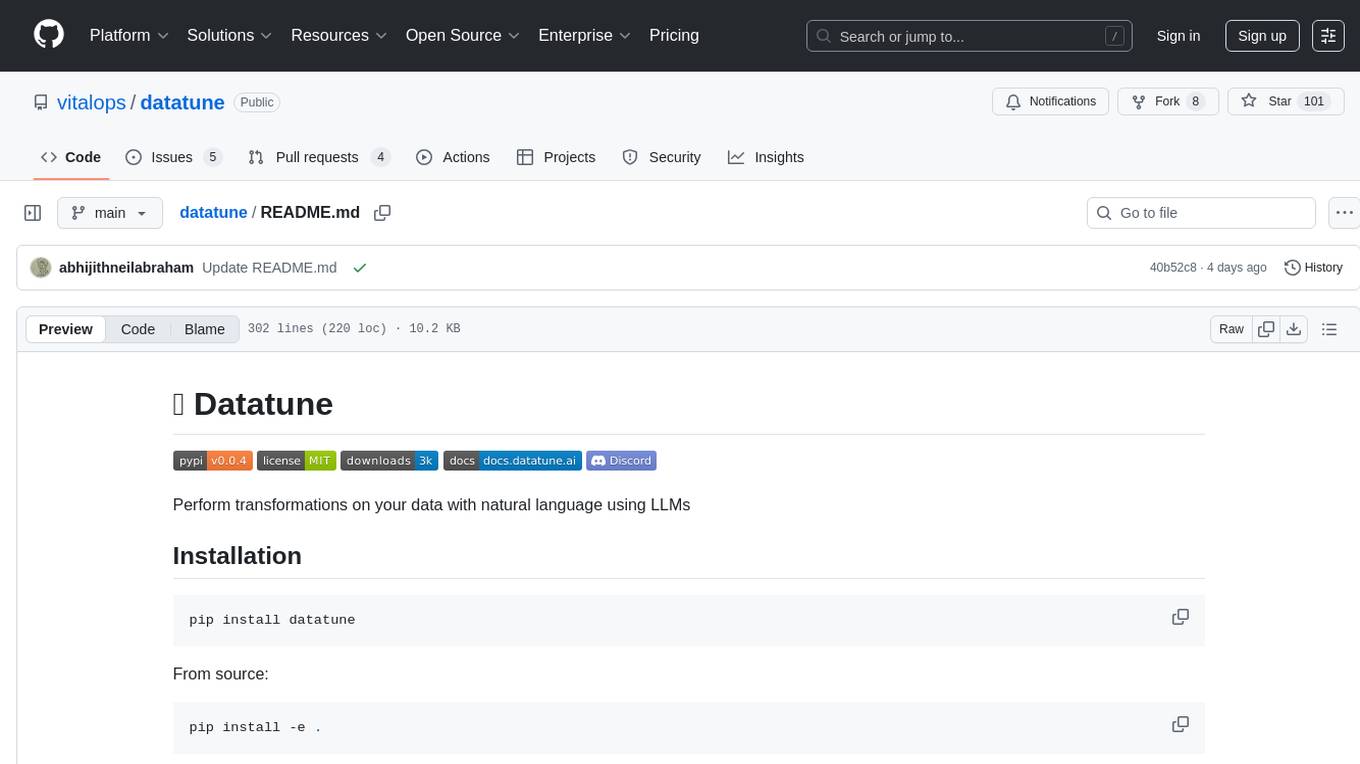
datatune
Datatune is a data analysis tool designed to help users explore and analyze datasets efficiently. It provides a user-friendly interface for importing, cleaning, visualizing, and modeling data. With Datatune, users can easily perform tasks such as data preprocessing, feature engineering, model selection, and evaluation. The tool offers a variety of statistical and machine learning algorithms to support data analysis tasks. Whether you are a data scientist, analyst, or researcher, Datatune can streamline your data analysis workflow and help you derive valuable insights from your data.
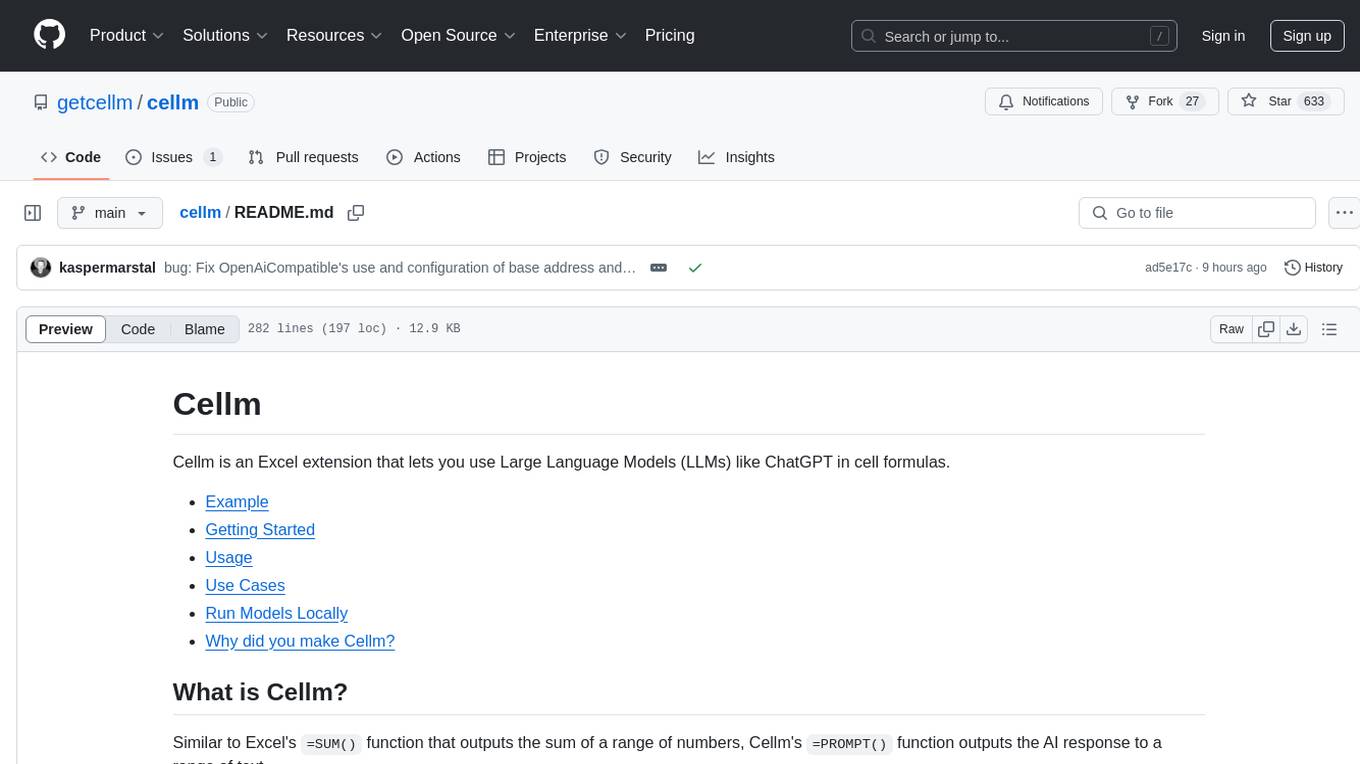
cellm
Cellm is an Excel extension that allows users to leverage Large Language Models (LLMs) like ChatGPT within cell formulas. It enables users to extract AI responses to text ranges, making it useful for automating repetitive tasks that involve data processing and analysis. Cellm supports various models from Anthropic, Mistral, OpenAI, and Google, as well as locally hosted models via Llamafiles, Ollama, or vLLM. The tool is designed to simplify the integration of AI capabilities into Excel for tasks such as text classification, data cleaning, content summarization, entity extraction, and more.
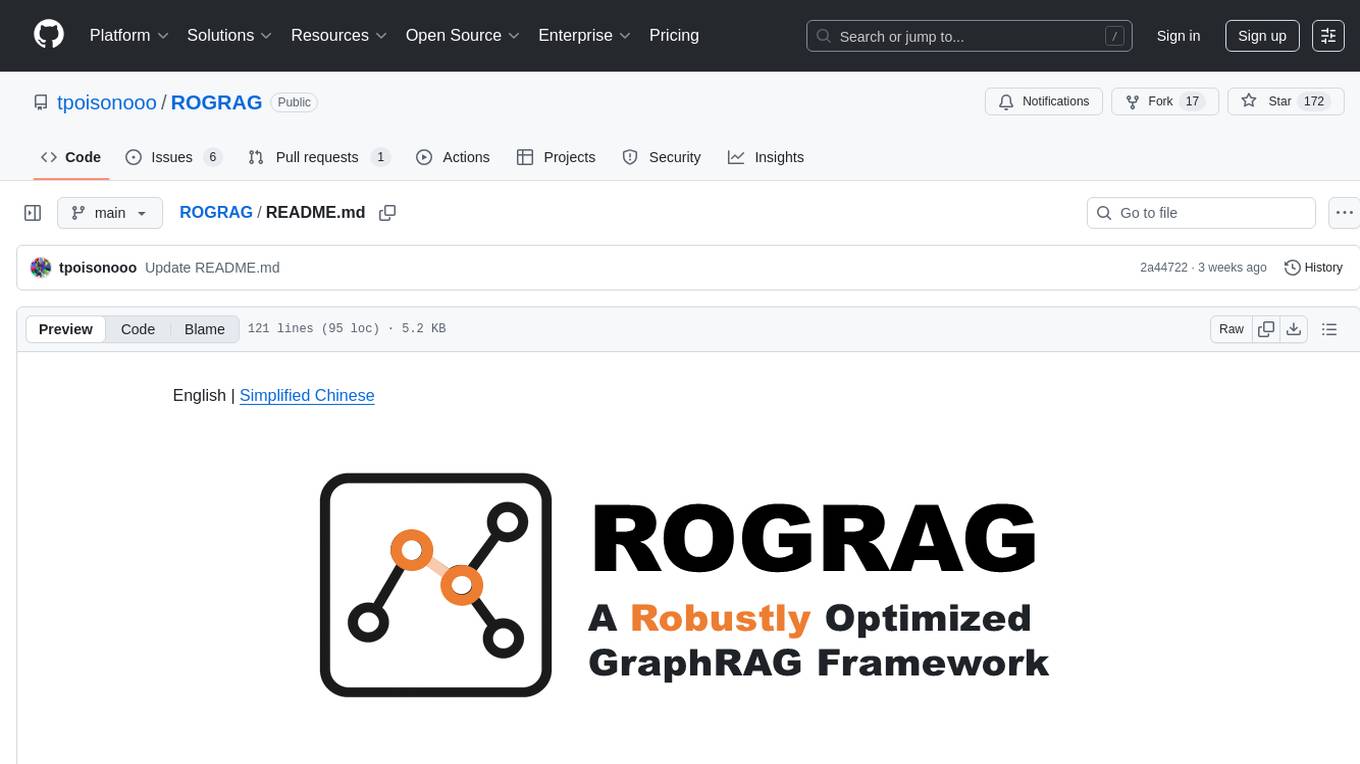
ROGRAG
ROGRAG is a powerful open-source tool designed for data analysis and visualization. It provides a user-friendly interface for exploring and manipulating datasets, making it ideal for researchers, data scientists, and analysts. With ROGRAG, users can easily import, clean, analyze, and visualize data to gain valuable insights and make informed decisions. The tool supports a wide range of data formats and offers a variety of statistical and visualization tools to help users uncover patterns, trends, and relationships in their data. Whether you are working on exploratory data analysis, statistical modeling, or data visualization, ROGRAG is a versatile tool that can streamline your workflow and enhance your data analysis capabilities.
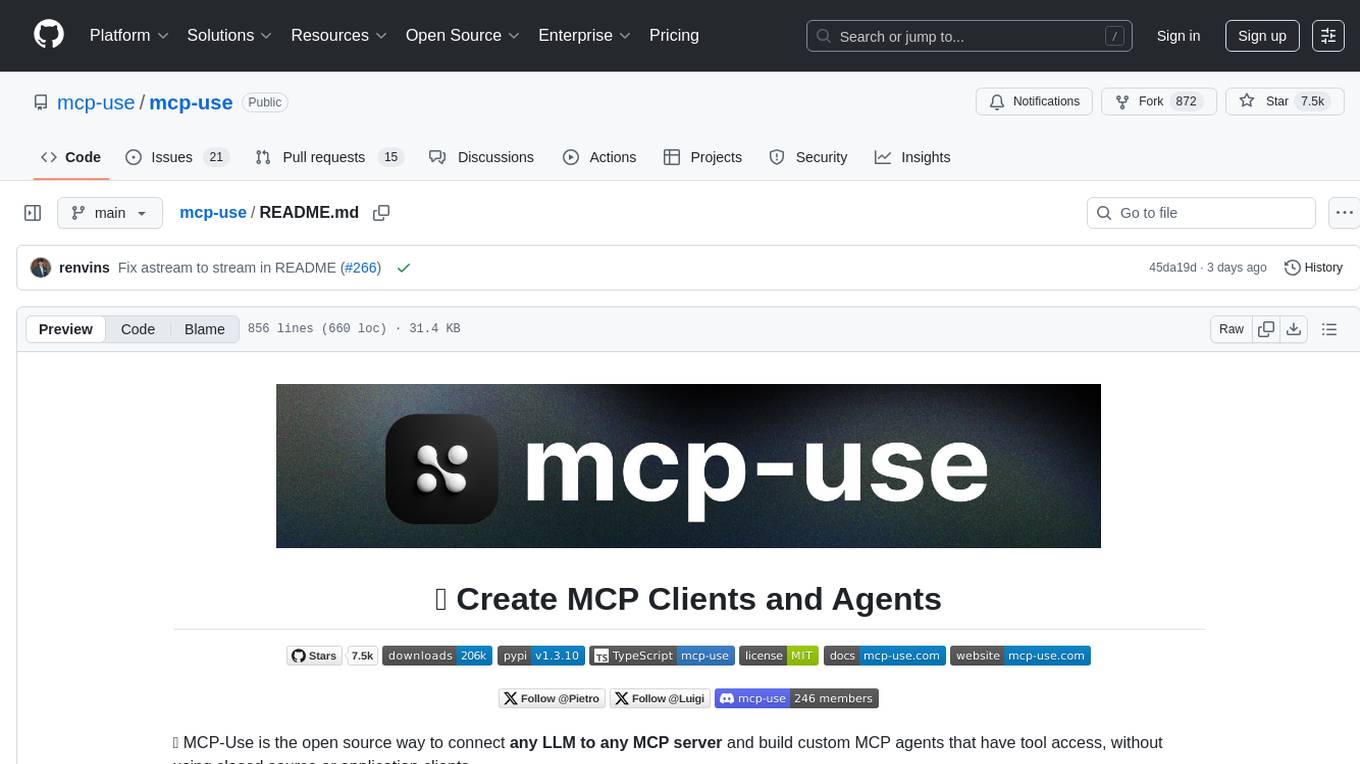
mcp-use
MCP-Use is a Python library for analyzing and processing text data using Markov Chains. It provides functionalities for generating text based on input data, calculating transition probabilities, and simulating text sequences. The library is designed to be user-friendly and efficient, making it suitable for natural language processing tasks.
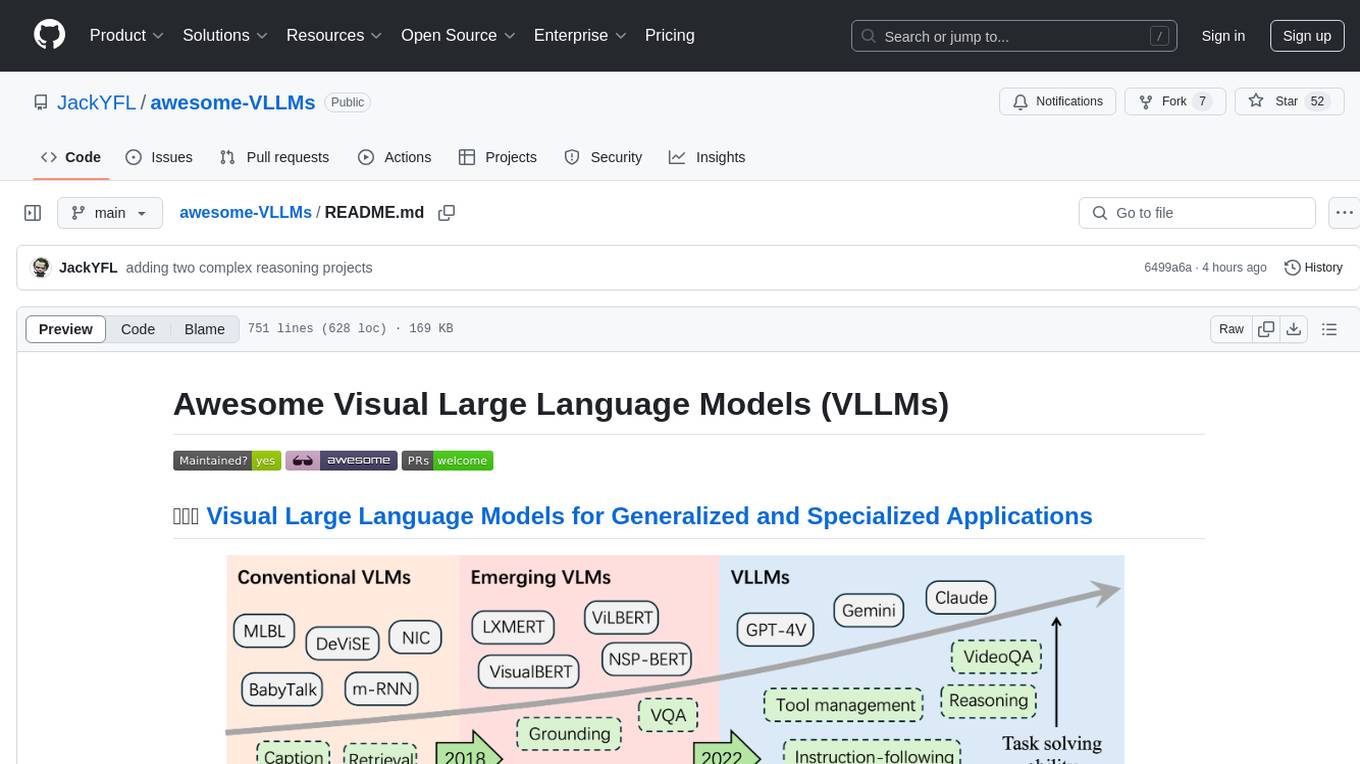
awesome-VLLMs
This repository contains a collection of pre-trained Very Large Language Models (VLLMs) that can be used for various natural language processing tasks. The models are fine-tuned on large text corpora and can be easily integrated into existing NLP pipelines for tasks such as text generation, sentiment analysis, and language translation. The repository also provides code examples and tutorials to help users get started with using these powerful language models in their projects.
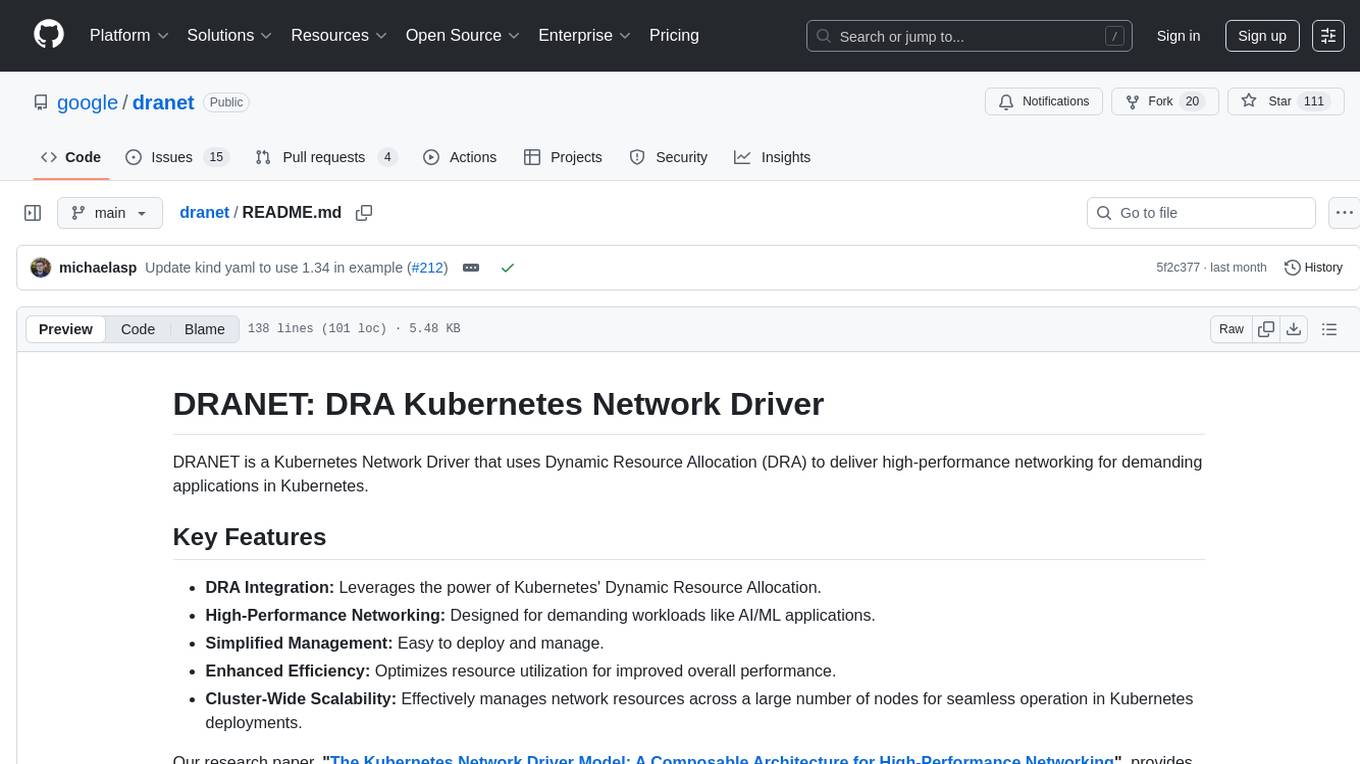
dranet
Dranet is a Python library for analyzing and visualizing data from neural networks. It provides tools for interpreting model predictions, understanding feature importance, and evaluating model performance. With Dranet, users can gain insights into how neural networks make decisions and improve model transparency and interpretability.
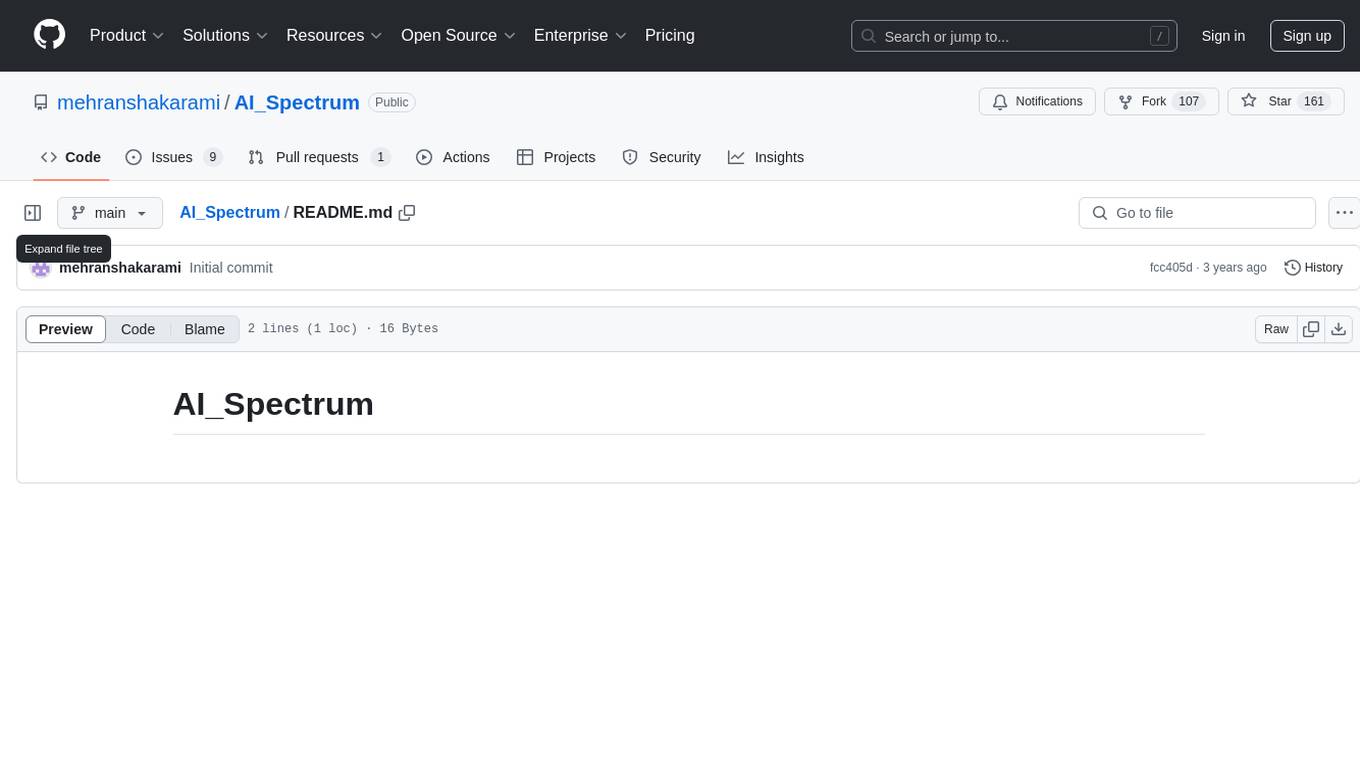
AI_Spectrum
AI_Spectrum is a versatile machine learning library that provides a wide range of tools and algorithms for building and deploying AI models. It offers a user-friendly interface for data preprocessing, model training, and evaluation. With AI_Spectrum, users can easily experiment with different machine learning techniques and optimize their models for various tasks. The library is designed to be flexible and scalable, making it suitable for both beginners and experienced data scientists.

upgini
Upgini is an intelligent data search engine with a Python library that helps users find and add relevant features to their ML pipeline from various public, community, and premium external data sources. It automates the optimization of connected data sources by generating an optimal set of machine learning features using large language models, GraphNNs, and recurrent neural networks. The tool aims to simplify feature search and enrichment for external data to make it a standard approach in machine learning pipelines. It democratizes access to data sources for the data science community.
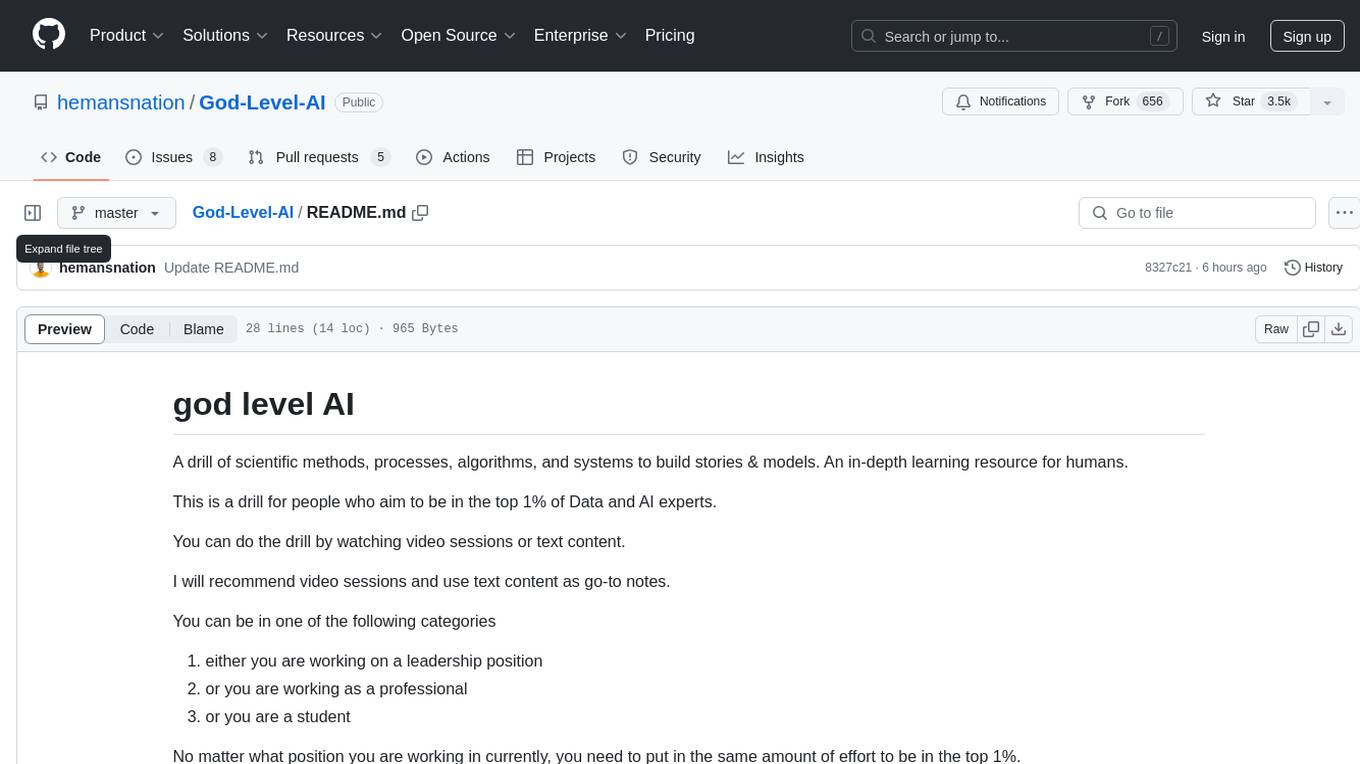
God-Level-AI
A drill of scientific methods, processes, algorithms, and systems to build stories & models. An in-depth learning resource for humans. This repository is designed for individuals aiming to excel in the field of Data and AI, providing video sessions and text content for learning. It caters to those in leadership positions, professionals, and students, emphasizing the need for dedicated effort to achieve excellence in the tech field. The content covers various topics with a focus on practical application.
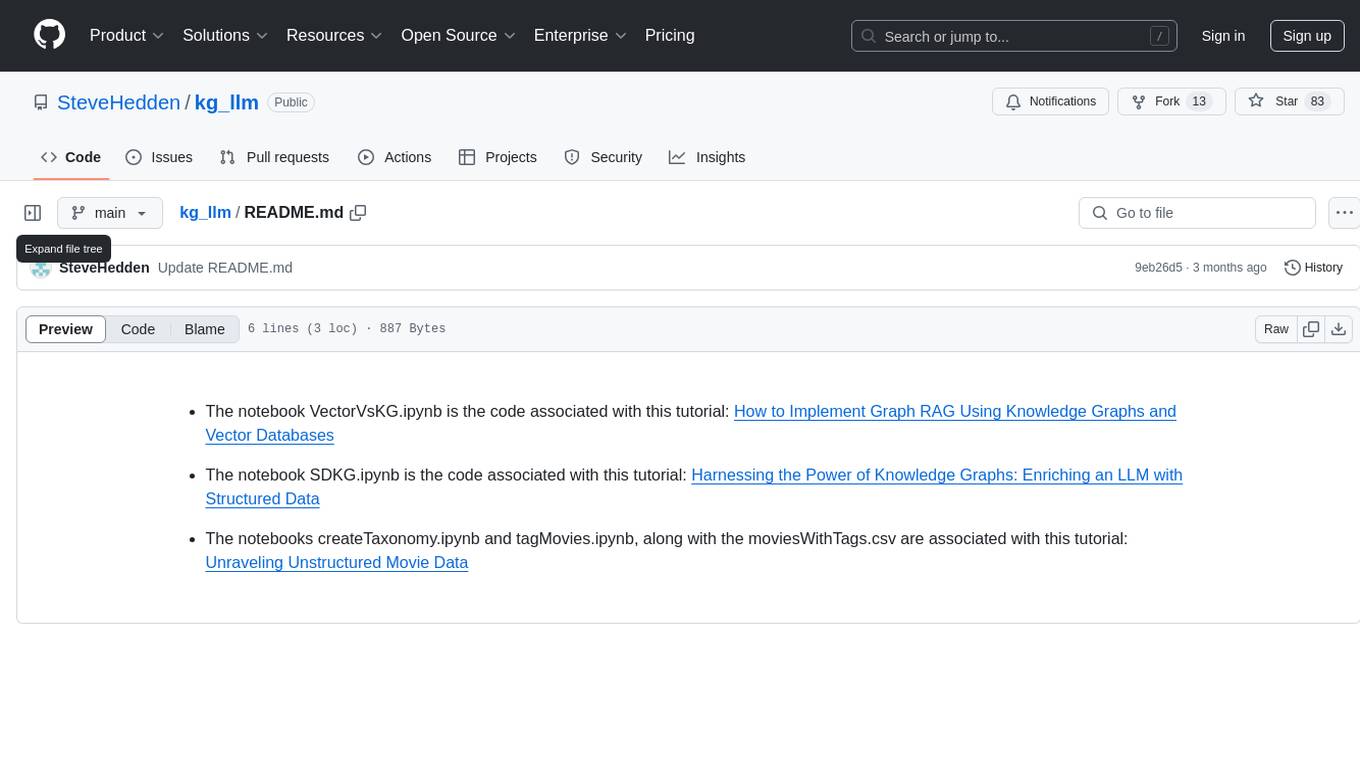
kg_llm
This repository contains code associated with tutorials on implementing graph RAG using knowledge graphs and vector databases, enriching an LLM with structured data, and unraveling unstructured movie data. It includes notebooks for various tasks such as creating taxonomy, tagging movies, and working with movie data in CSV format.
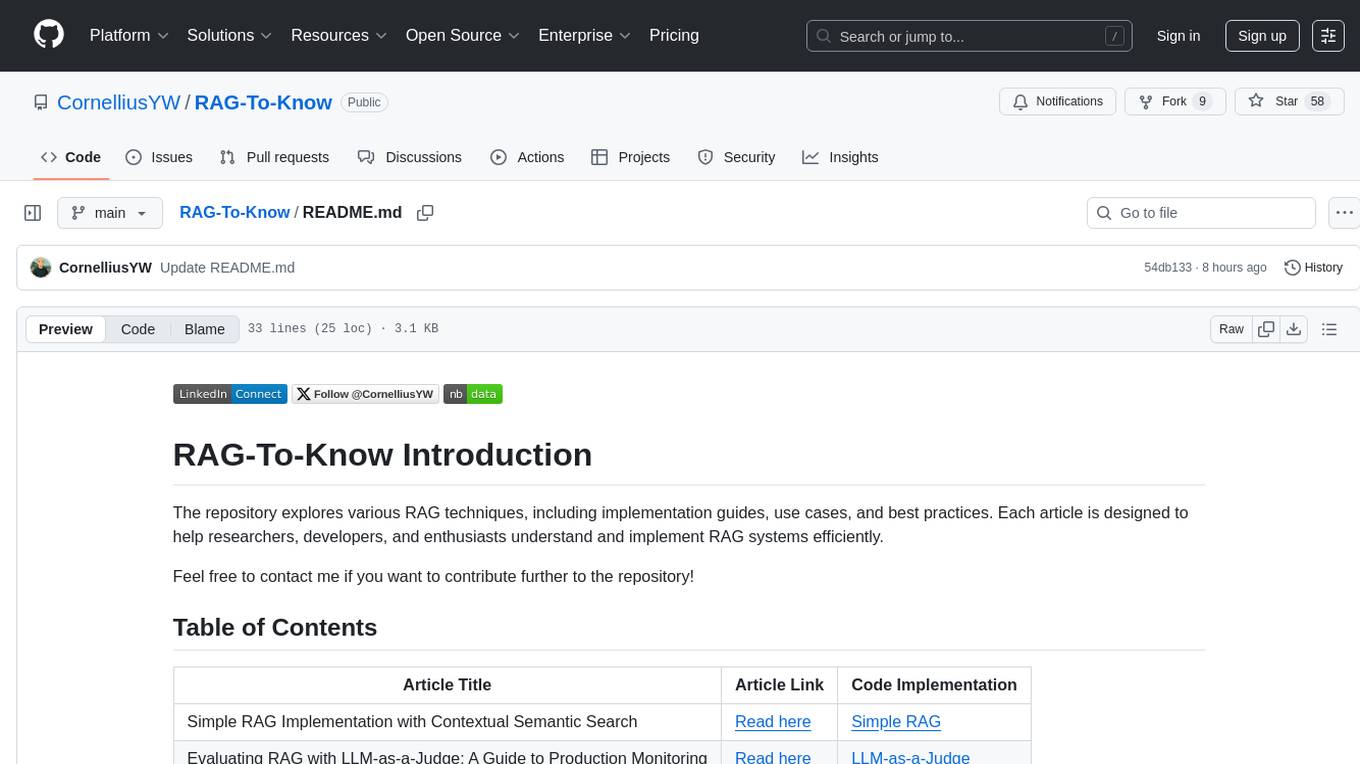
RAG-To-Know
RAG-To-Know is a versatile tool for knowledge extraction and summarization. It leverages the RAG (Retrieval-Augmented Generation) framework to provide a seamless way to retrieve and summarize information from various sources. With RAG-To-Know, users can easily extract key insights and generate concise summaries from large volumes of text data. The tool is designed to streamline the process of information retrieval and summarization, making it ideal for researchers, students, journalists, and anyone looking to quickly grasp the essence of complex information.
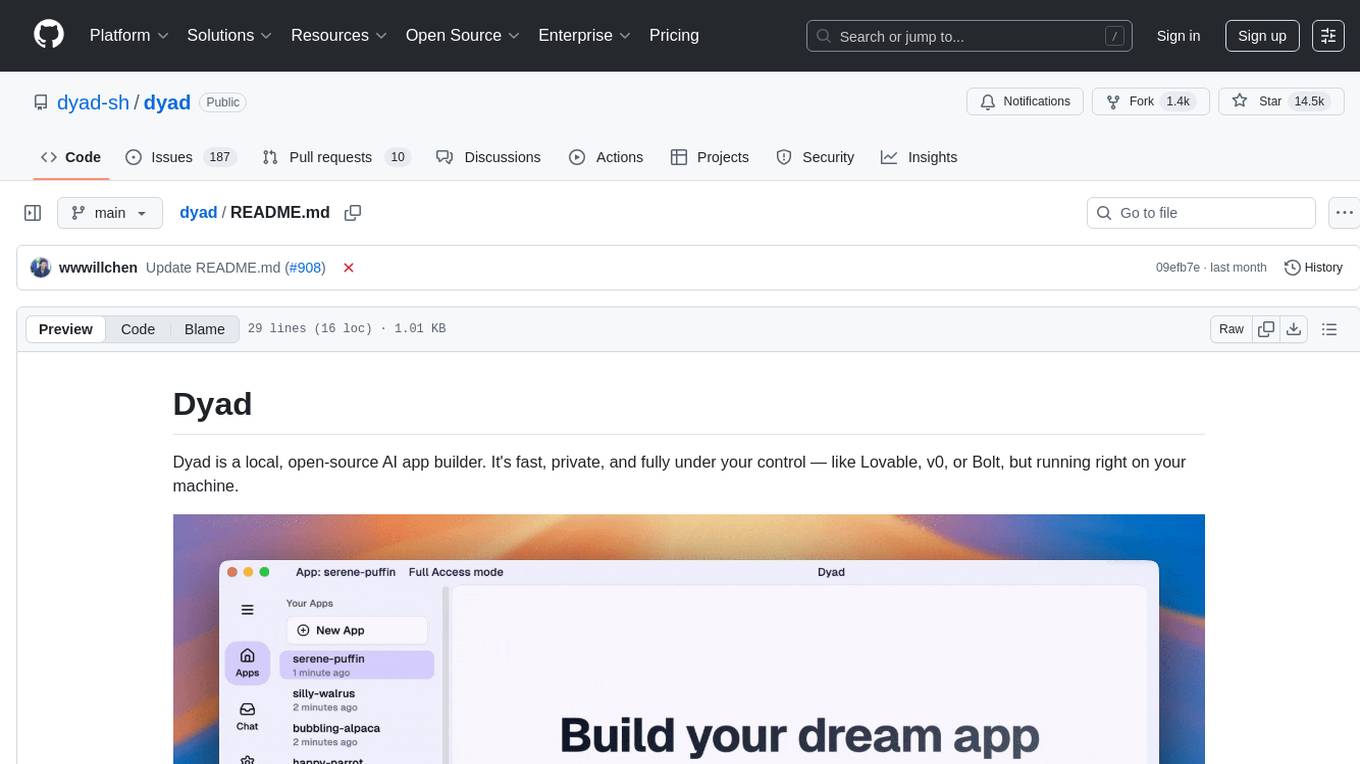
dyad
Dyad is a lightweight Python library for analyzing dyadic data, which involves pairs of individuals and their interactions. It provides functions for computing various network metrics, visualizing network structures, and conducting statistical analyses on dyadic data. Dyad is designed to be user-friendly and efficient, making it suitable for researchers and practitioners working with relational data in fields such as social network analysis, communication studies, and psychology.
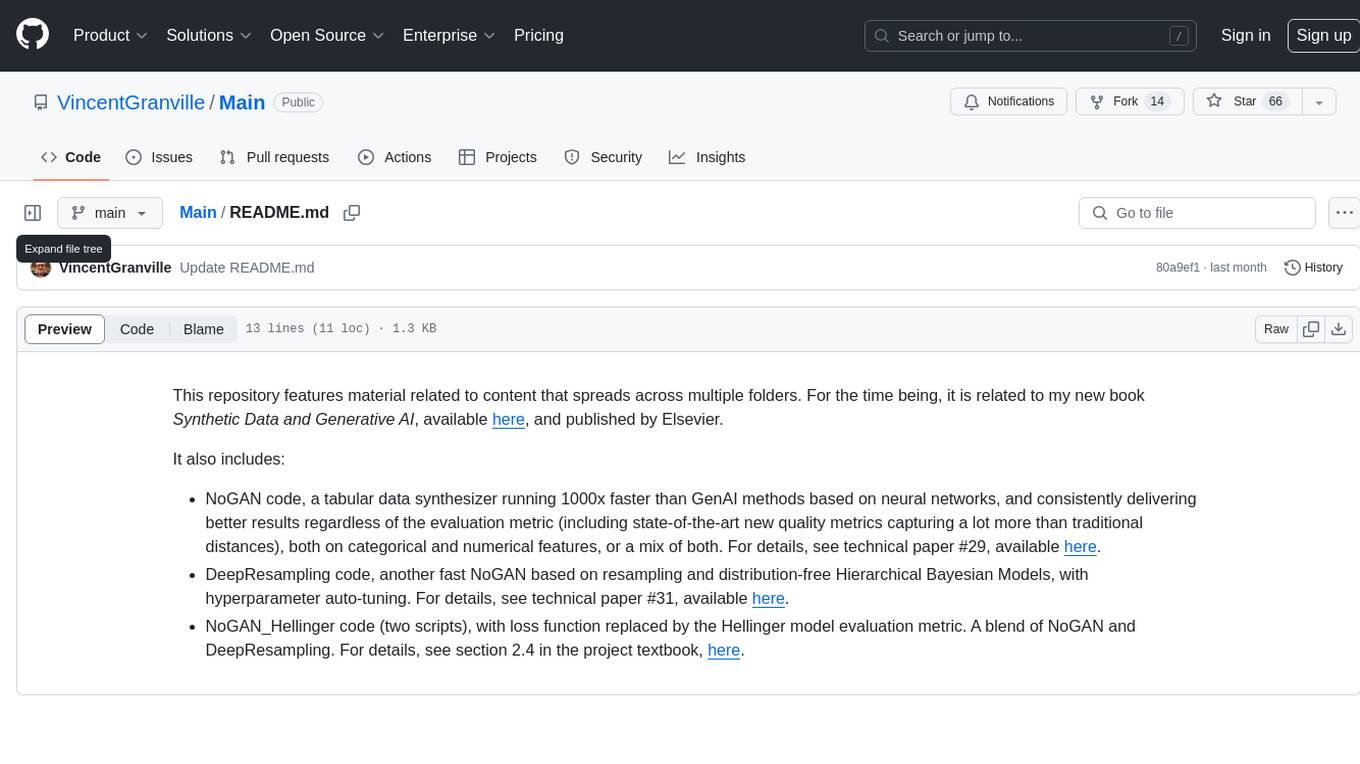
Main
This repository contains material related to the new book _Synthetic Data and Generative AI_ by the author, including code for NoGAN, DeepResampling, and NoGAN_Hellinger. NoGAN is a tabular data synthesizer that outperforms GenAI methods in terms of speed and results, utilizing state-of-the-art quality metrics. DeepResampling is a fast NoGAN based on resampling and Bayesian Models with hyperparameter auto-tuning. NoGAN_Hellinger combines NoGAN and DeepResampling with the Hellinger model evaluation metric.

lemonai
LemonAI is a versatile machine learning library designed to simplify the process of building and deploying AI models. It provides a wide range of tools and algorithms for data preprocessing, model training, and evaluation. With LemonAI, users can easily experiment with different machine learning techniques and optimize their models for various tasks. The library is well-documented and beginner-friendly, making it suitable for both novice and experienced data scientists. LemonAI aims to streamline the development of AI applications and empower users to create innovative solutions using state-of-the-art machine learning methods.
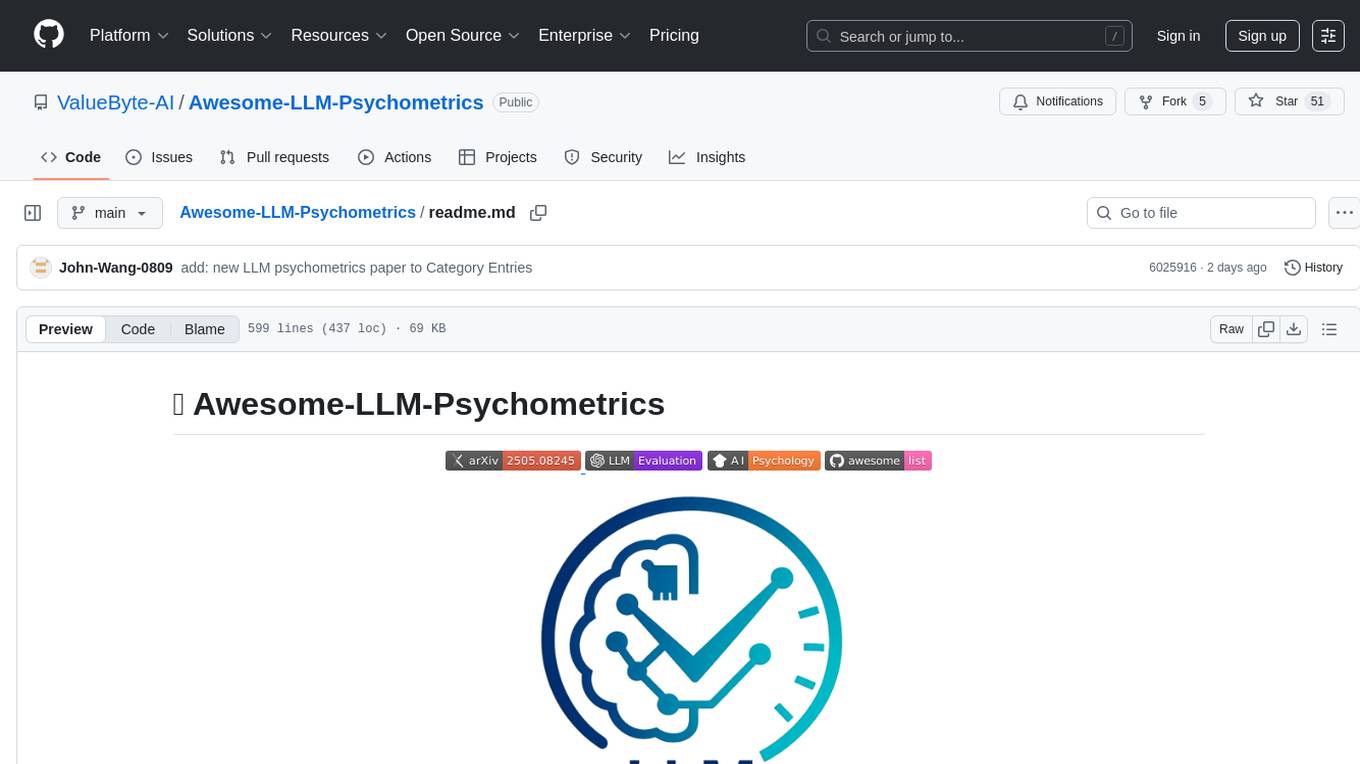
Awesome-LLM-Psychometrics
This repository contains a collection of tools and resources for conducting psychometric analysis in the context of latent variable modeling. It includes scripts for data preprocessing, model estimation, and results interpretation. The tools provided here aim to assist researchers and practitioners in the field of psychology and related disciplines to analyze complex relationships among latent variables using advanced statistical techniques.
For similar tasks

nlp-llms-resources
The 'nlp-llms-resources' repository is a comprehensive resource list for Natural Language Processing (NLP) and Large Language Models (LLMs). It covers a wide range of topics including traditional NLP datasets, data acquisition, libraries for NLP, neural networks, sentiment analysis, optical character recognition, information extraction, semantics, topic modeling, multilingual NLP, domain-specific LLMs, vector databases, ethics, costing, books, courses, surveys, aggregators, newsletters, papers, conferences, and societies. The repository provides valuable information and resources for individuals interested in NLP and LLMs.
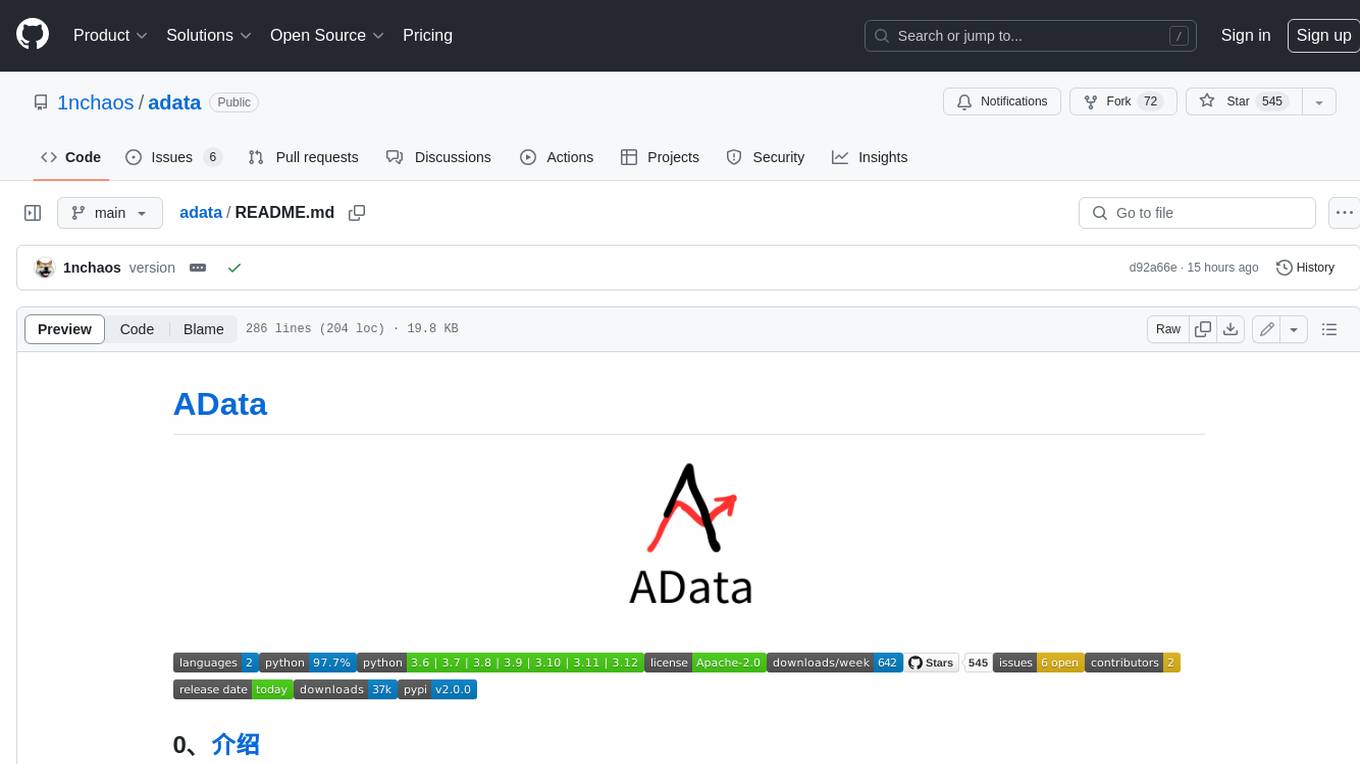
adata
AData is a free and open-source A-share database that focuses on transaction-related data. It provides comprehensive data on stocks, including basic information, market data, and sentiment analysis. AData is designed to be easy to use and integrate with other applications, making it a valuable tool for quantitative trading and AI training.

PIXIU
PIXIU is a project designed to support the development, fine-tuning, and evaluation of Large Language Models (LLMs) in the financial domain. It includes components like FinBen, a Financial Language Understanding and Prediction Evaluation Benchmark, FIT, a Financial Instruction Dataset, and FinMA, a Financial Large Language Model. The project provides open resources, multi-task and multi-modal financial data, and diverse financial tasks for training and evaluation. It aims to encourage open research and transparency in the financial NLP field.
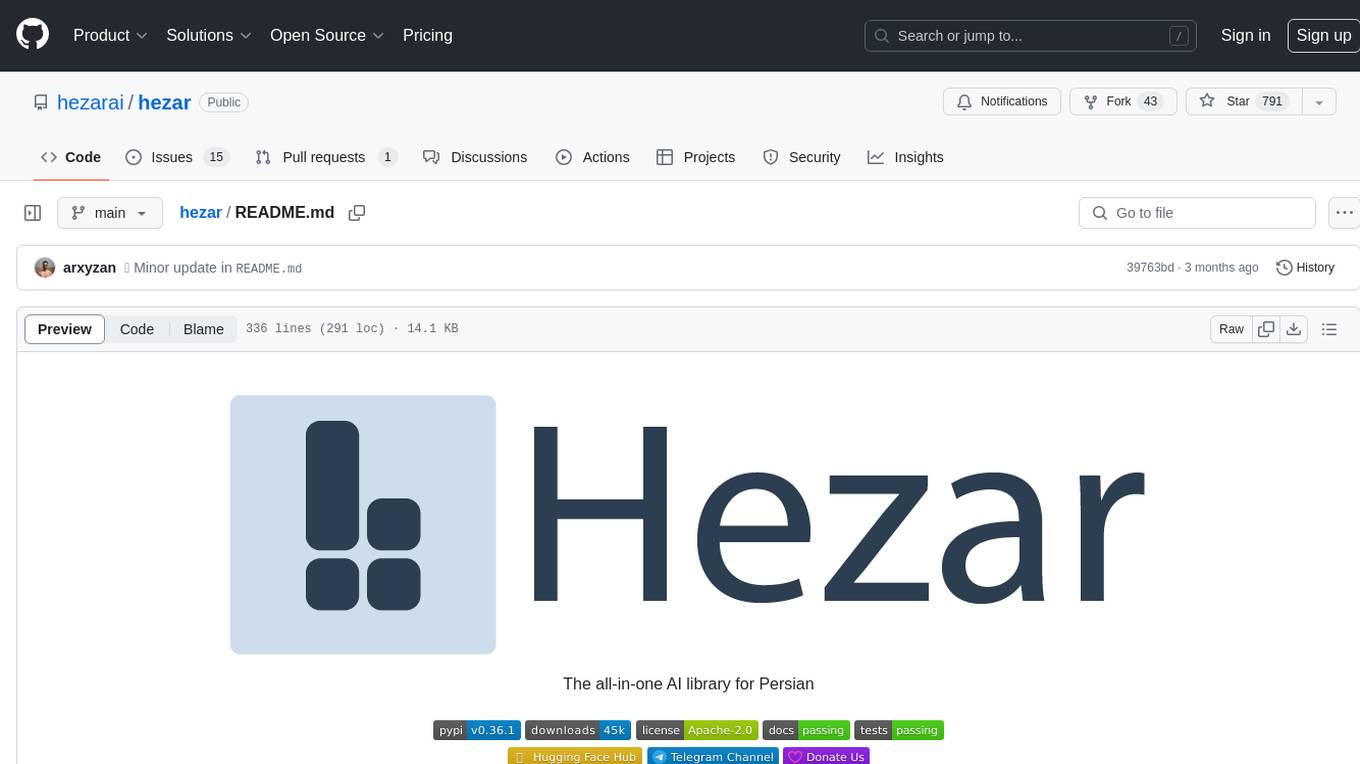
hezar
Hezar is an all-in-one AI library designed specifically for the Persian community. It brings together various AI models and tools, making it easy to use AI with just a few lines of code. The library seamlessly integrates with Hugging Face Hub, offering a developer-friendly interface and task-based model interface. In addition to models, Hezar provides tools like word embeddings, tokenizers, feature extractors, and more. It also includes supplementary ML tools for deployment, benchmarking, and optimization.
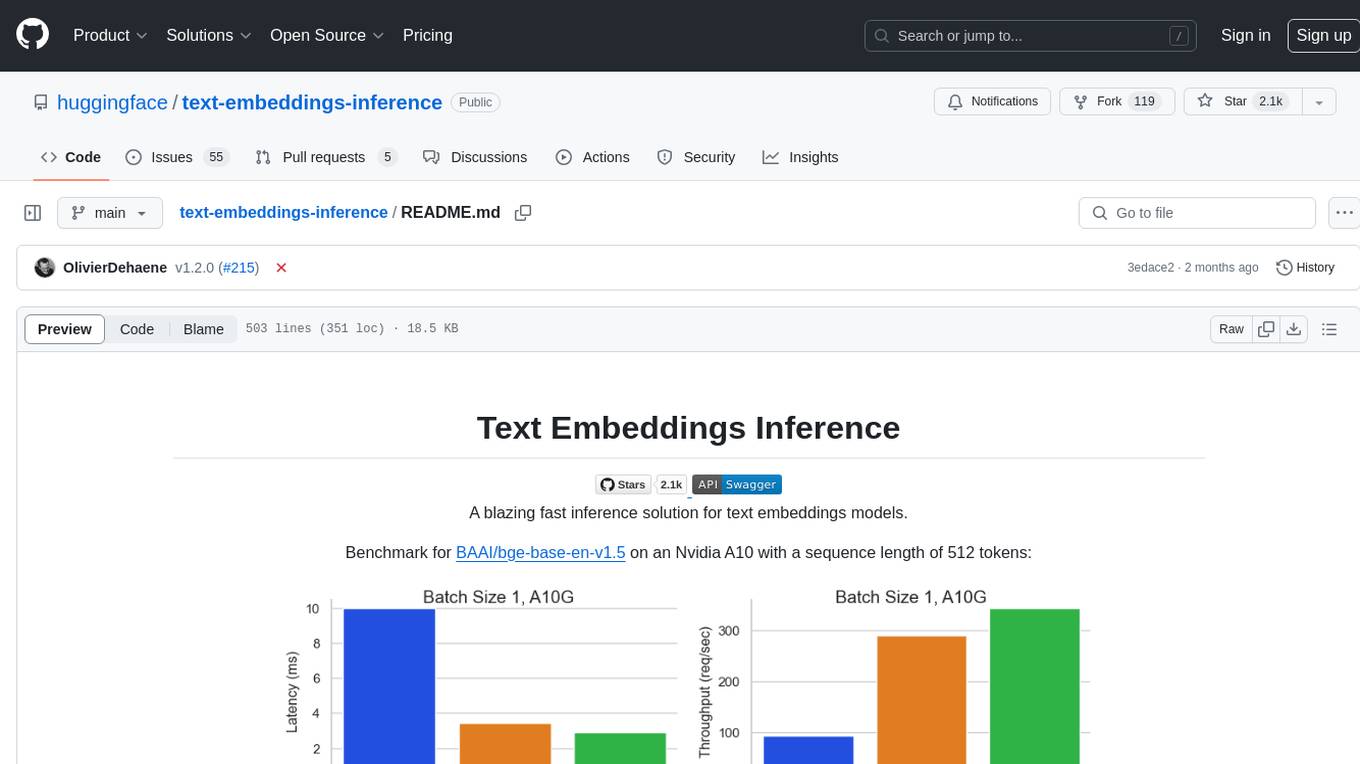
text-embeddings-inference
Text Embeddings Inference (TEI) is a toolkit for deploying and serving open source text embeddings and sequence classification models. TEI enables high-performance extraction for popular models like FlagEmbedding, Ember, GTE, and E5. It implements features such as no model graph compilation step, Metal support for local execution on Macs, small docker images with fast boot times, token-based dynamic batching, optimized transformers code for inference using Flash Attention, Candle, and cuBLASLt, Safetensors weight loading, and production-ready features like distributed tracing with Open Telemetry and Prometheus metrics.

CodeProject.AI-Server
CodeProject.AI Server is a standalone, self-hosted, fast, free, and open-source Artificial Intelligence microserver designed for any platform and language. It can be installed locally without the need for off-device or out-of-network data transfer, providing an easy-to-use solution for developers interested in AI programming. The server includes a HTTP REST API server, backend analysis services, and the source code, enabling users to perform various AI tasks locally without relying on external services or cloud computing. Current capabilities include object detection, face detection, scene recognition, sentiment analysis, and more, with ongoing feature expansions planned. The project aims to promote AI development, simplify AI implementation, focus on core use-cases, and leverage the expertise of the developer community.
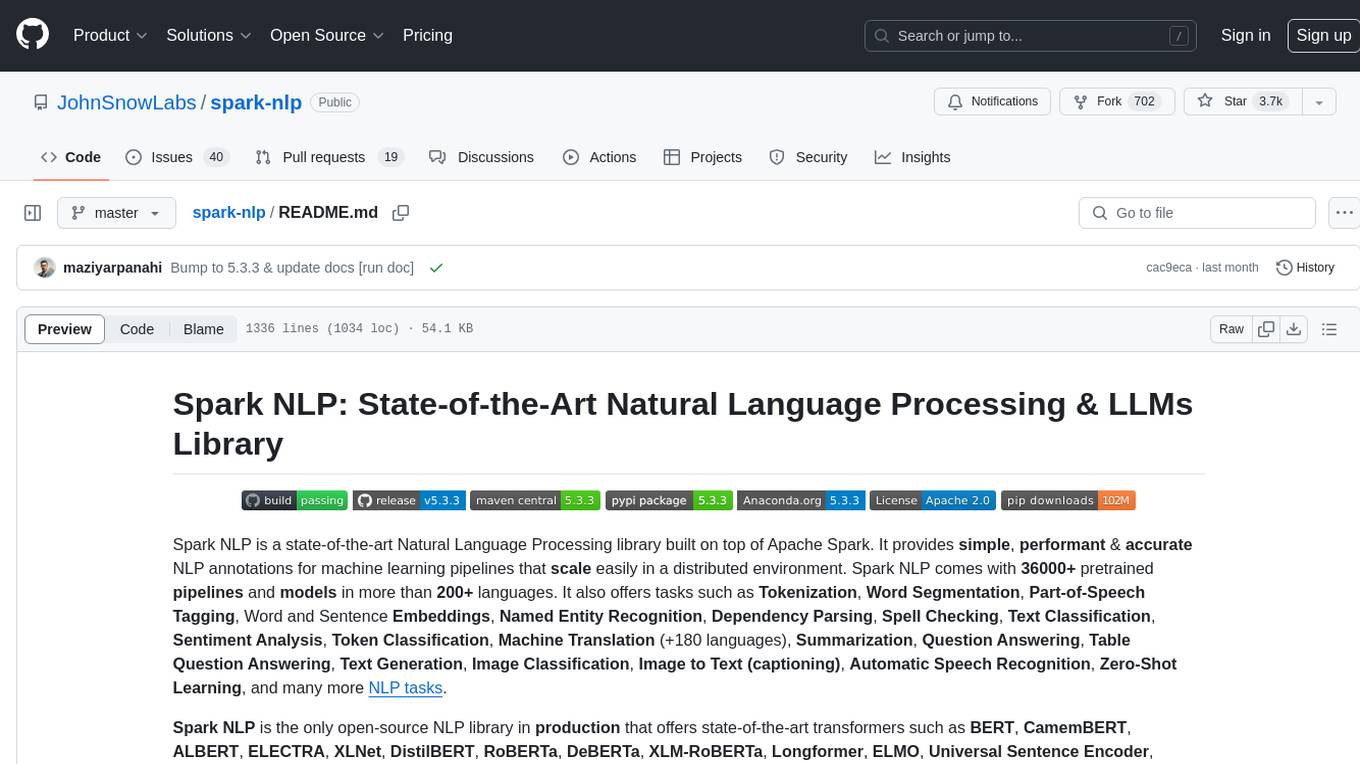
spark-nlp
Spark NLP is a state-of-the-art Natural Language Processing library built on top of Apache Spark. It provides simple, performant, and accurate NLP annotations for machine learning pipelines that scale easily in a distributed environment. Spark NLP comes with 36000+ pretrained pipelines and models in more than 200+ languages. It offers tasks such as Tokenization, Word Segmentation, Part-of-Speech Tagging, Named Entity Recognition, Dependency Parsing, Spell Checking, Text Classification, Sentiment Analysis, Token Classification, Machine Translation, Summarization, Question Answering, Table Question Answering, Text Generation, Image Classification, Image to Text (captioning), Automatic Speech Recognition, Zero-Shot Learning, and many more NLP tasks. Spark NLP is the only open-source NLP library in production that offers state-of-the-art transformers such as BERT, CamemBERT, ALBERT, ELECTRA, XLNet, DistilBERT, RoBERTa, DeBERTa, XLM-RoBERTa, Longformer, ELMO, Universal Sentence Encoder, Llama-2, M2M100, BART, Instructor, E5, Google T5, MarianMT, OpenAI GPT2, Vision Transformers (ViT), OpenAI Whisper, and many more not only to Python and R, but also to JVM ecosystem (Java, Scala, and Kotlin) at scale by extending Apache Spark natively.
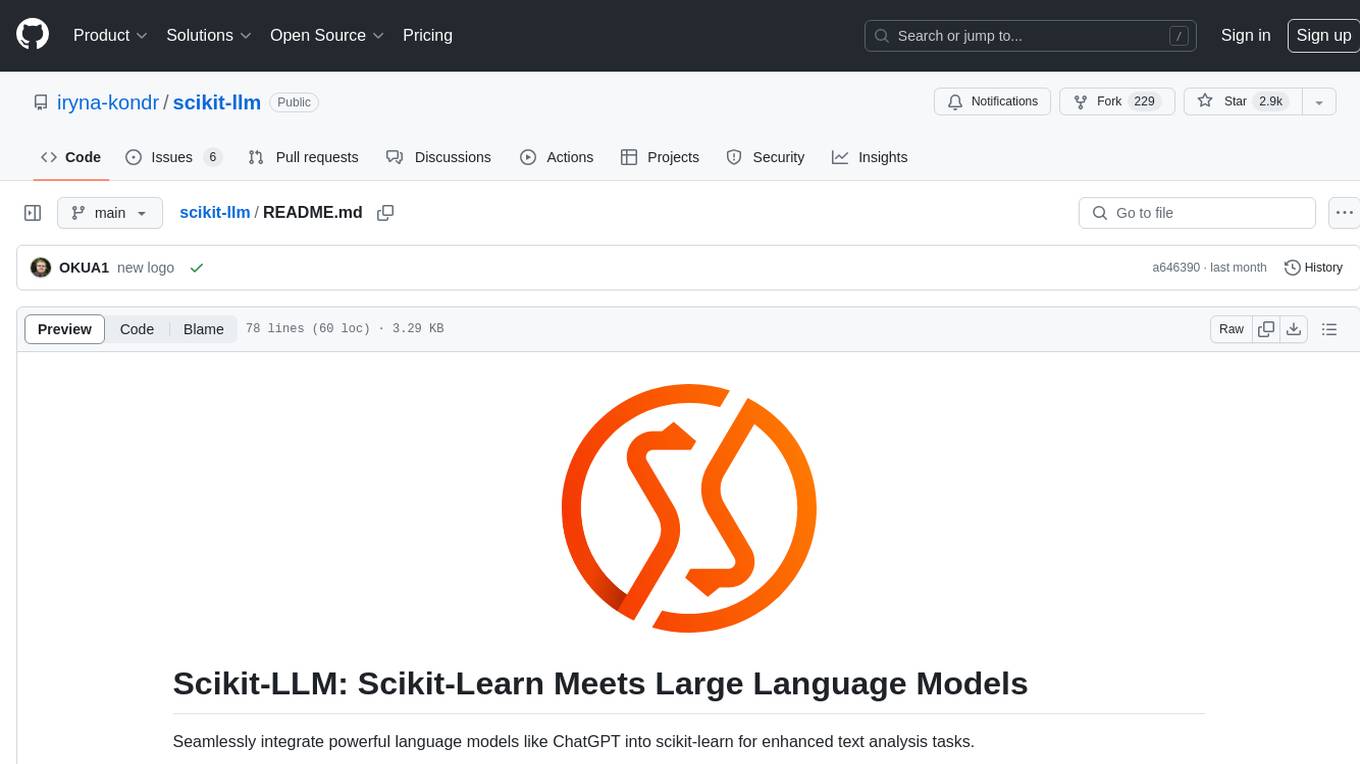
scikit-llm
Scikit-LLM is a tool that seamlessly integrates powerful language models like ChatGPT into scikit-learn for enhanced text analysis tasks. It allows users to leverage large language models for various text analysis applications within the familiar scikit-learn framework. The tool simplifies the process of incorporating advanced language processing capabilities into machine learning pipelines, enabling users to benefit from the latest advancements in natural language processing.
For similar jobs
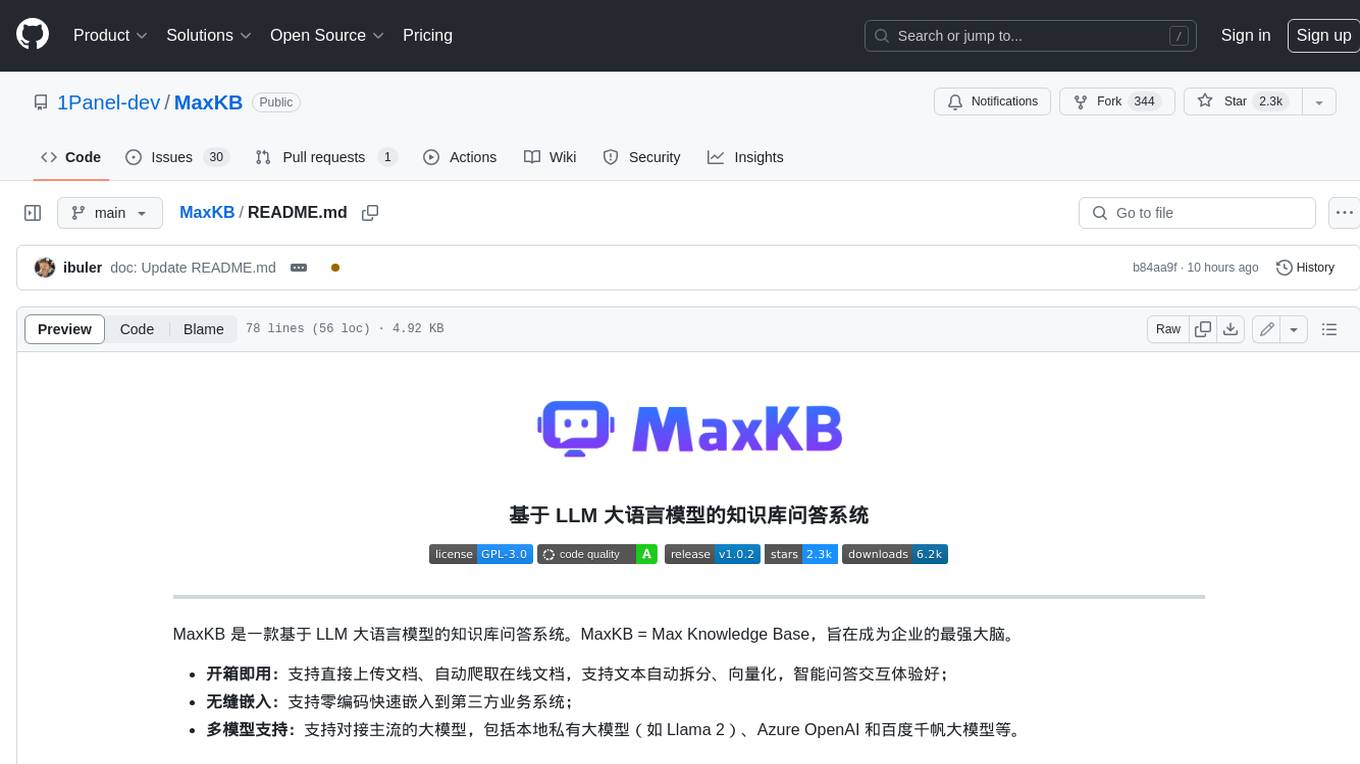
MaxKB
MaxKB is a knowledge base Q&A system based on the LLM large language model. MaxKB = Max Knowledge Base, which aims to become the most powerful brain of the enterprise.
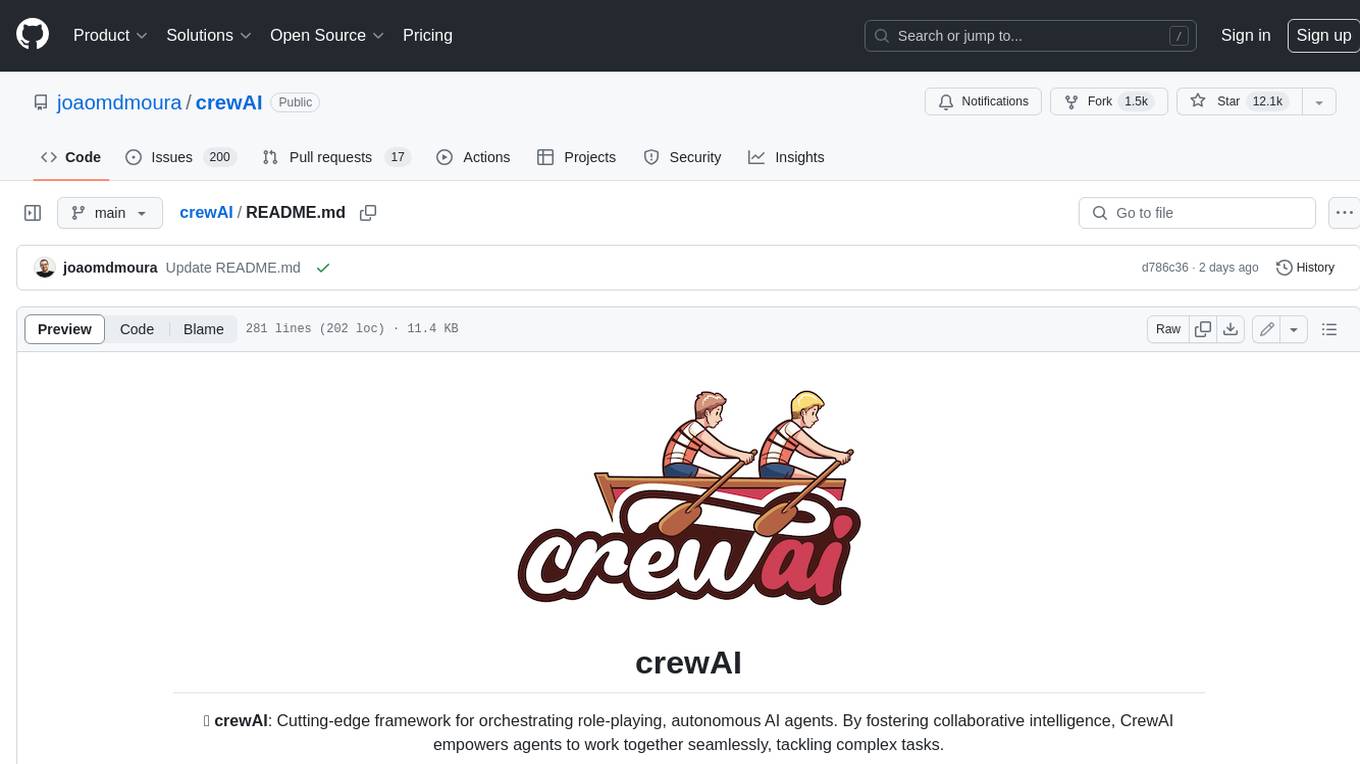
crewAI
crewAI is a cutting-edge framework for orchestrating role-playing, autonomous AI agents. By fostering collaborative intelligence, CrewAI empowers agents to work together seamlessly, tackling complex tasks. It provides a flexible and structured approach to AI collaboration, enabling users to define agents with specific roles, goals, and tools, and assign them tasks within a customizable process. crewAI supports integration with various LLMs, including OpenAI, and offers features such as autonomous task delegation, flexible task management, and output parsing. It is open-source and welcomes contributions, with a focus on improving the library based on usage data collected through anonymous telemetry.
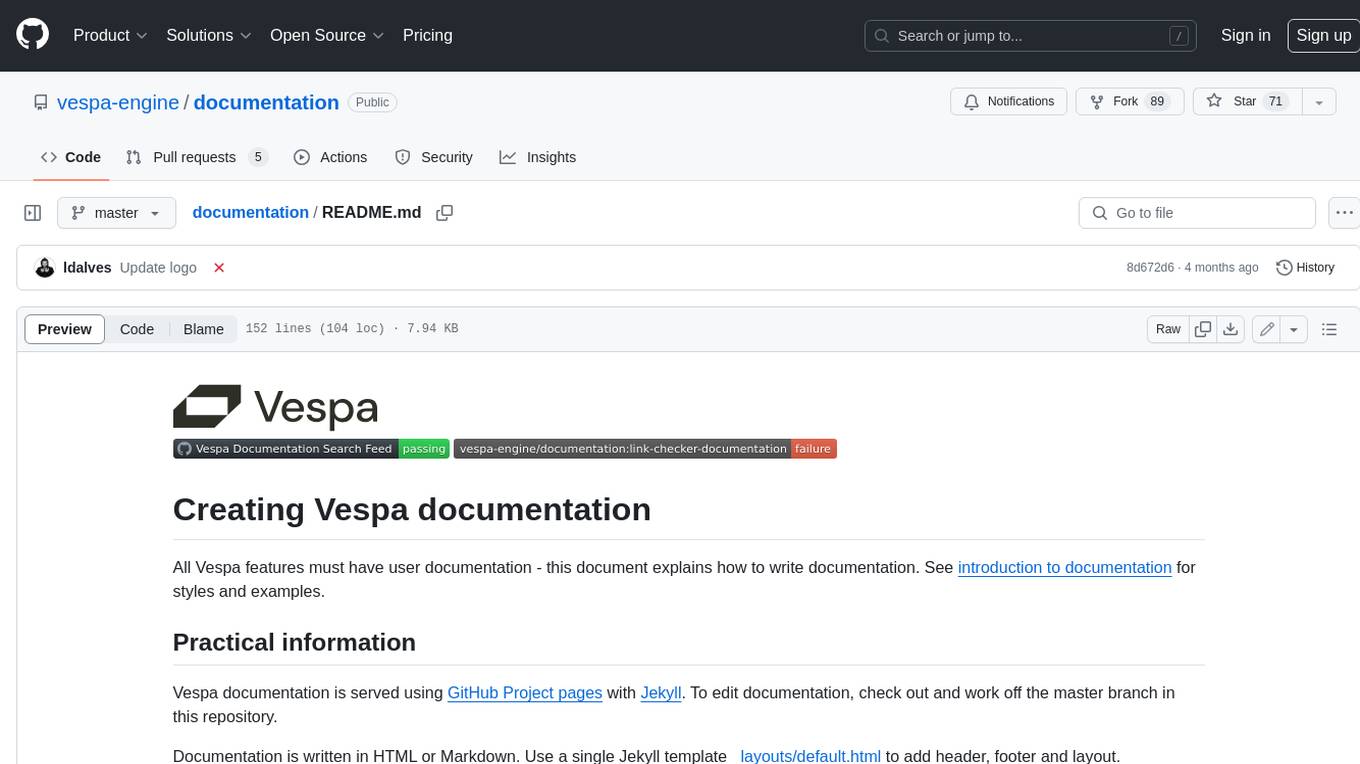
documentation
Vespa documentation is served using GitHub Project pages with Jekyll. To edit documentation, check out and work off the master branch in this repository. Documentation is written in HTML or Markdown. Use a single Jekyll template _layouts/default.html to add header, footer and layout. Install bundler, then $ bundle install $ bundle exec jekyll serve --incremental --drafts --trace to set up a local server at localhost:4000 to see the pages as they will look when served. If you get strange errors on bundle install try $ export PATH=“/usr/local/opt/[email protected]/bin:$PATH” $ export LDFLAGS=“-L/usr/local/opt/[email protected]/lib” $ export CPPFLAGS=“-I/usr/local/opt/[email protected]/include” $ export PKG_CONFIG_PATH=“/usr/local/opt/[email protected]/lib/pkgconfig” The output will highlight rendering/other problems when starting serving. Alternatively, use the docker image `jekyll/jekyll` to run the local server on Mac $ docker run -ti --rm --name doc \ --publish 4000:4000 -e JEKYLL_UID=$UID -v $(pwd):/srv/jekyll \ jekyll/jekyll jekyll serve or RHEL 8 $ podman run -it --rm --name doc -p 4000:4000 -e JEKYLL_ROOTLESS=true \ -v "$PWD":/srv/jekyll:Z docker.io/jekyll/jekyll jekyll serve The layout is written in denali.design, see _layouts/default.html for usage. Please do not add custom style sheets, as it is harder to maintain.
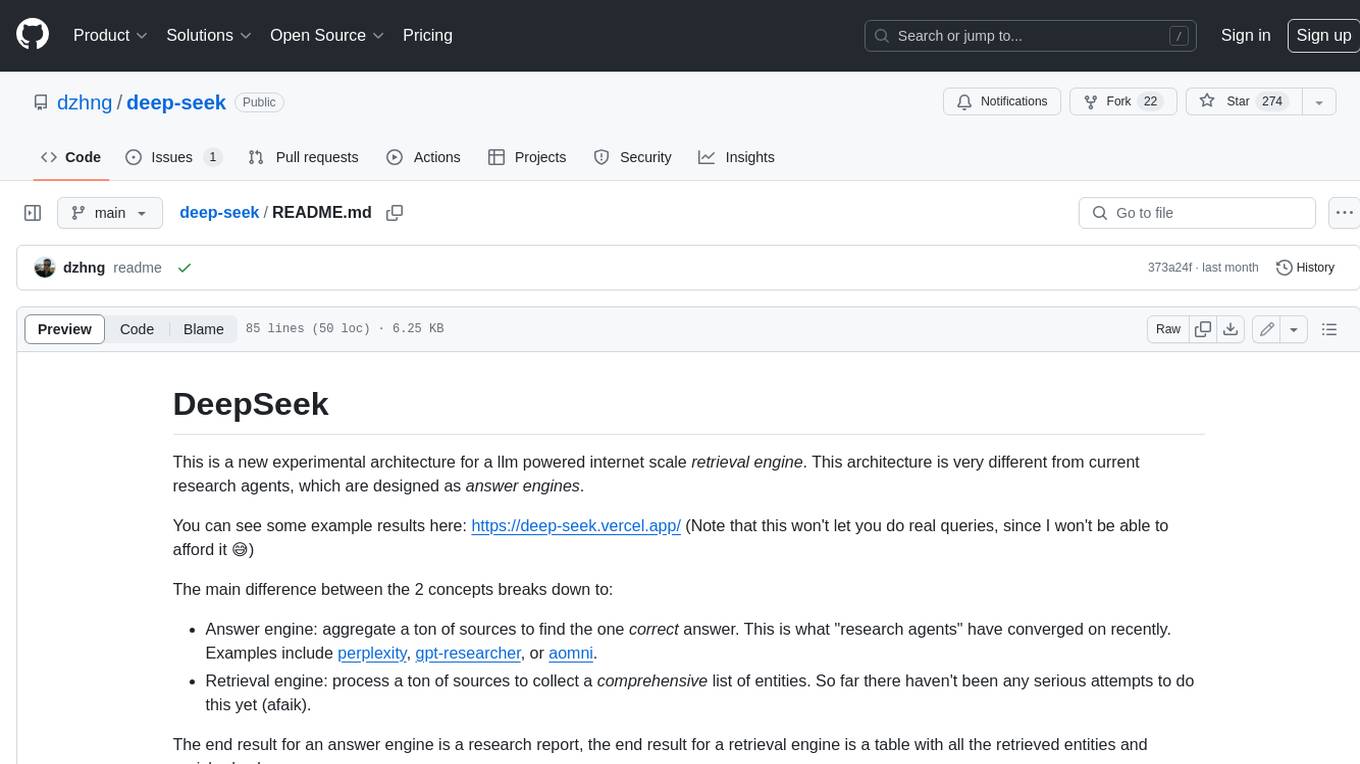
deep-seek
DeepSeek is a new experimental architecture for a large language model (LLM) powered internet-scale retrieval engine. Unlike current research agents designed as answer engines, DeepSeek aims to process a vast amount of sources to collect a comprehensive list of entities and enrich them with additional relevant data. The end result is a table with retrieved entities and enriched columns, providing a comprehensive overview of the topic. DeepSeek utilizes both standard keyword search and neural search to find relevant content, and employs an LLM to extract specific entities and their associated contents. It also includes a smaller answer agent to enrich the retrieved data, ensuring thoroughness. DeepSeek has the potential to revolutionize research and information gathering by providing a comprehensive and structured way to access information from the vastness of the internet.
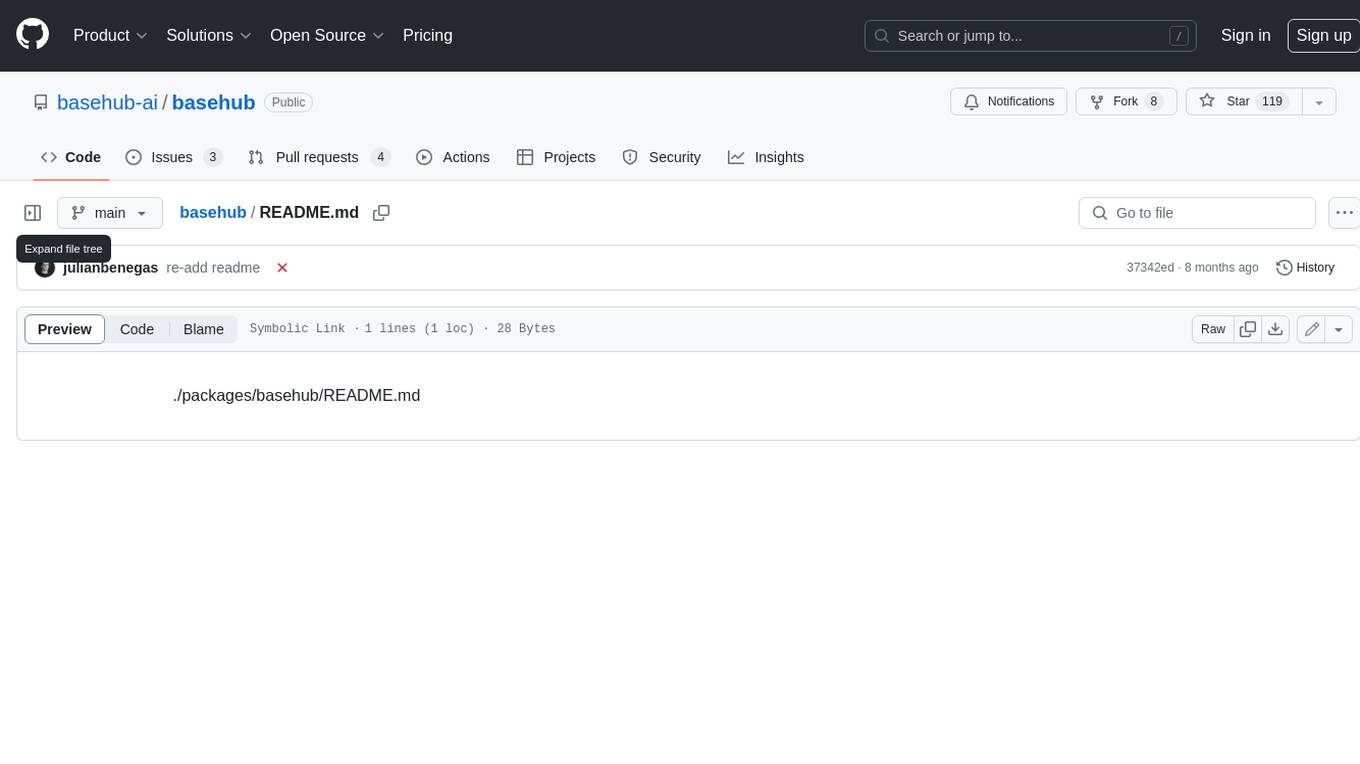
basehub
JavaScript / TypeScript SDK for BaseHub, the first AI-native content hub. **Features:** * ✨ Infers types from your BaseHub repository... _meaning IDE autocompletion works great._ * 🏎️ No dependency on graphql... _meaning your bundle is more lightweight._ * 🌐 Works everywhere `fetch` is supported... _meaning you can use it anywhere._
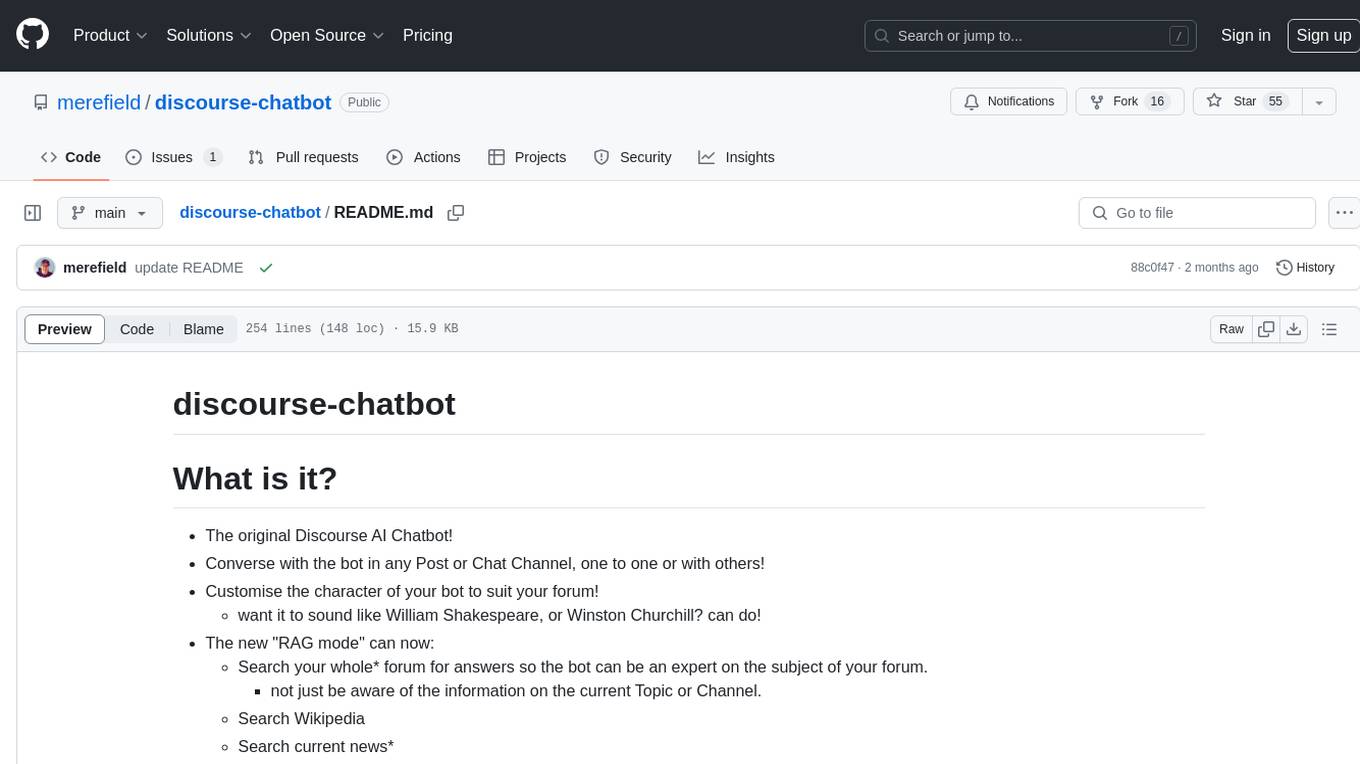
discourse-chatbot
The discourse-chatbot is an original AI chatbot for Discourse forums that allows users to converse with the bot in posts or chat channels. Users can customize the character of the bot, enable RAG mode for expert answers, search Wikipedia, news, and Google, provide market data, perform accurate math calculations, and experiment with vision support. The bot uses cutting-edge Open AI API and supports Azure and proxy server connections. It includes a quota system for access management and can be used in RAG mode or basic bot mode. The setup involves creating embeddings to make the bot aware of forum content and setting up bot access permissions based on trust levels. Users must obtain an API token from Open AI and configure group quotas to interact with the bot. The plugin is extensible to support other cloud bots and content search beyond the provided set.
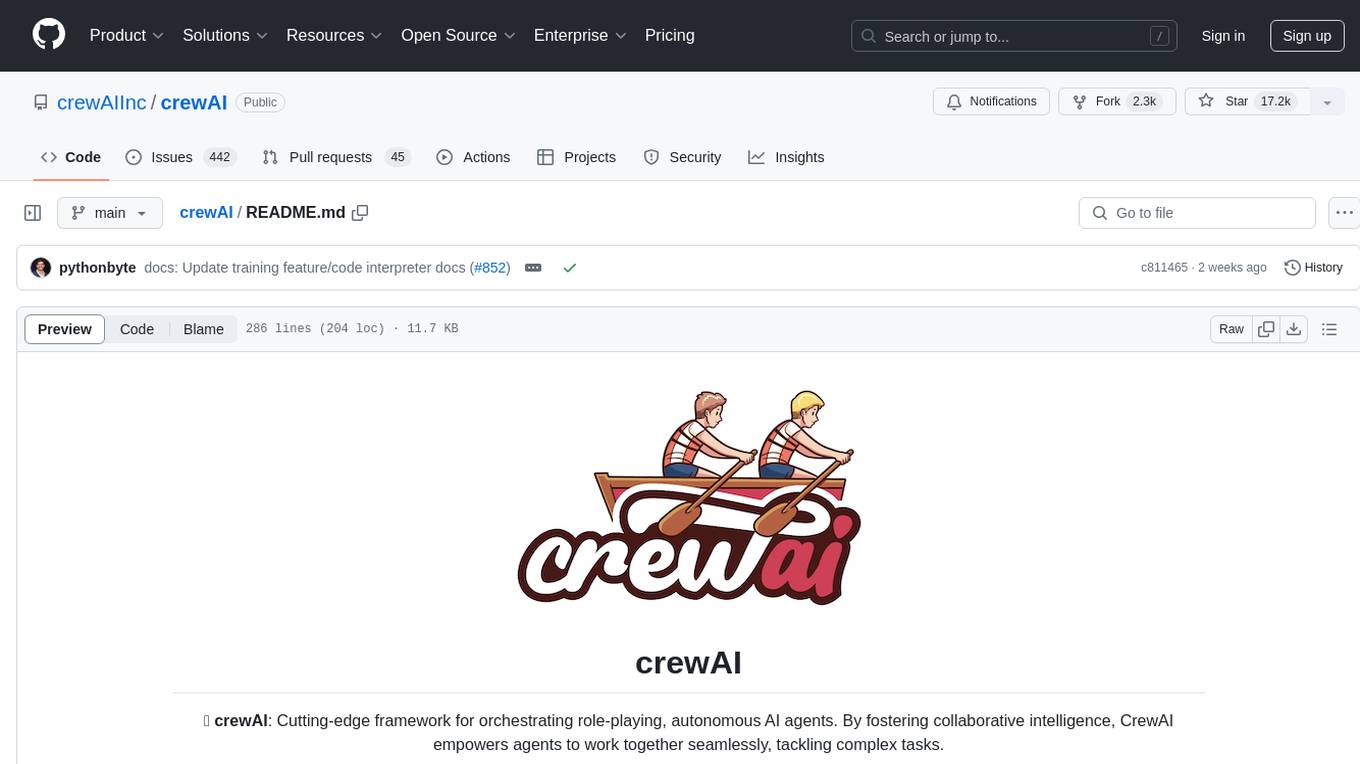
crewAI
CrewAI is a cutting-edge framework designed to orchestrate role-playing autonomous AI agents. By fostering collaborative intelligence, CrewAI empowers agents to work together seamlessly, tackling complex tasks. It enables AI agents to assume roles, share goals, and operate in a cohesive unit, much like a well-oiled crew. Whether you're building a smart assistant platform, an automated customer service ensemble, or a multi-agent research team, CrewAI provides the backbone for sophisticated multi-agent interactions. With features like role-based agent design, autonomous inter-agent delegation, flexible task management, and support for various LLMs, CrewAI offers a dynamic and adaptable solution for both development and production workflows.
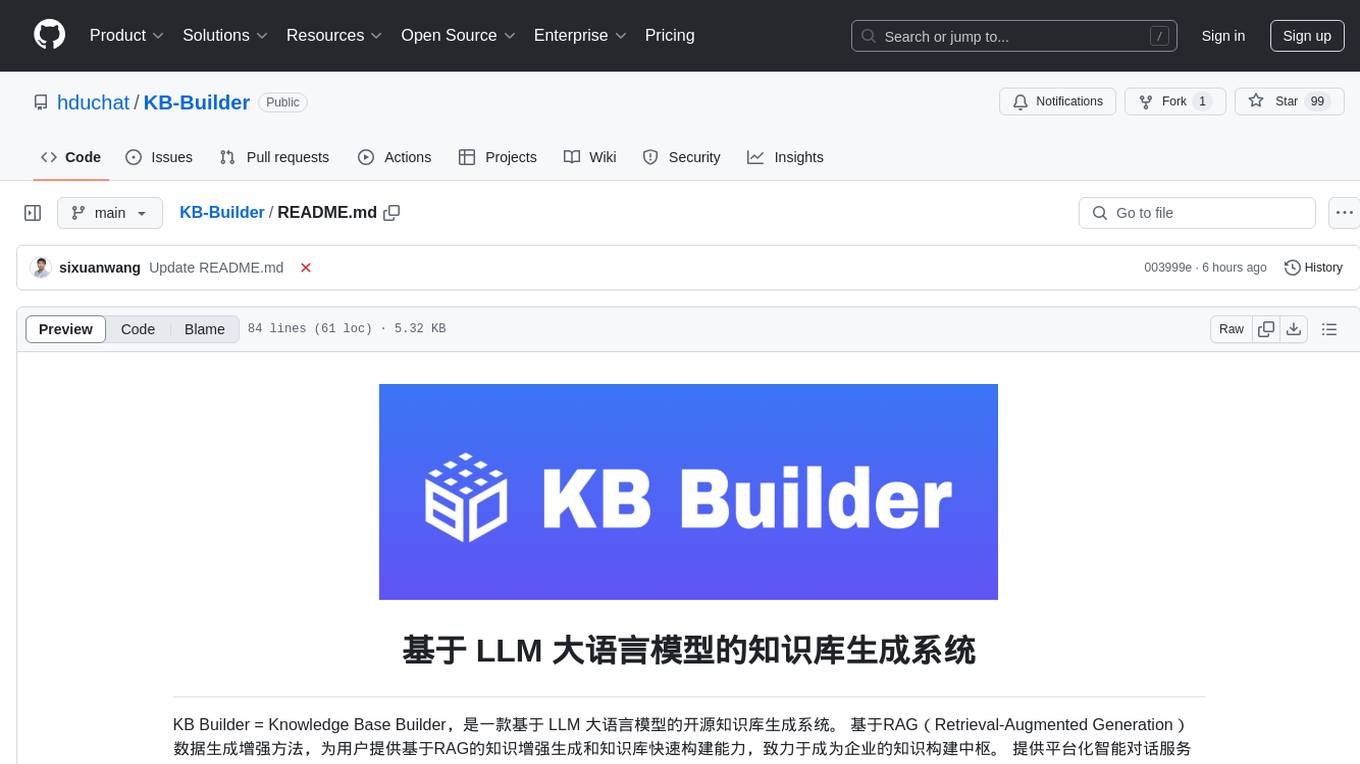
KB-Builder
KB Builder is an open-source knowledge base generation system based on the LLM large language model. It utilizes the RAG (Retrieval-Augmented Generation) data generation enhancement method to provide users with the ability to enhance knowledge generation and quickly build knowledge bases based on RAG. It aims to be the central hub for knowledge construction in enterprises, offering platform-based intelligent dialogue services and document knowledge base management functionality. Users can upload docx, pdf, txt, and md format documents and generate high-quality knowledge base question-answer pairs by invoking large models through the 'Parse Document' feature.
